
|
#953 (10/27/23)

|
|
BY TONY FOURNIER |
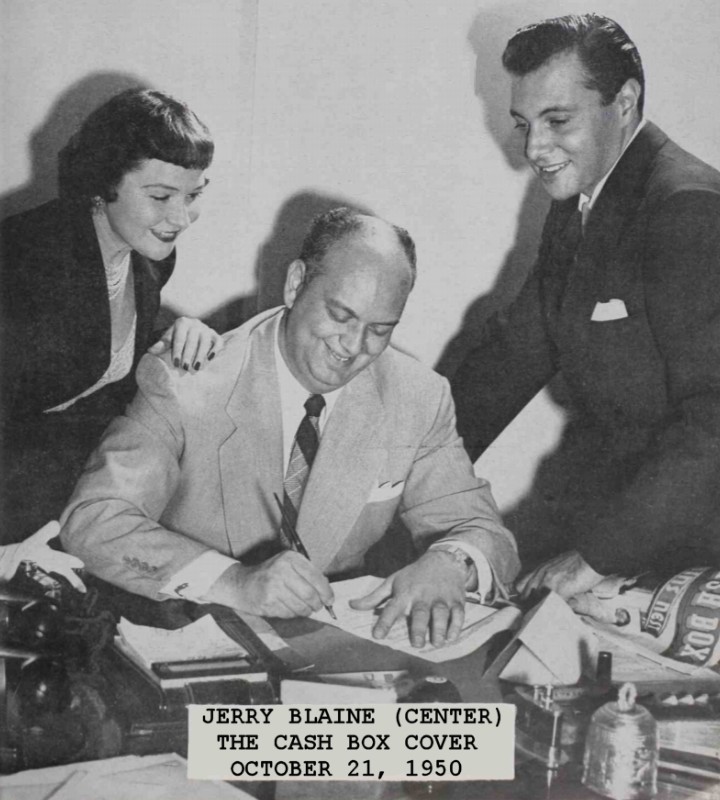
|
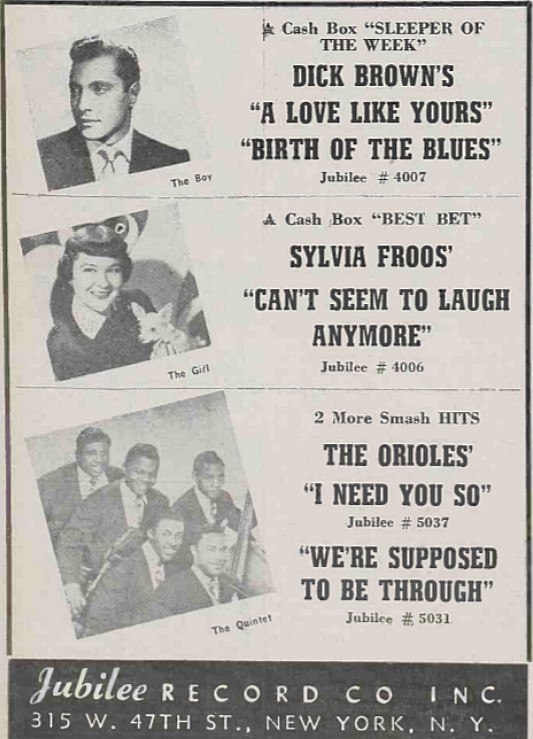
|
Above Left: CASH BOX COVER, October 21, 1950.
CAPTION: Smiles are the order of the day, as singers Sylvia Froos and Dick Brown eye Jubilee Records prexy Jerry Blaine adding his signature to their recording contracts. Both Sylvia and Dick have hot juke box material in their respective renditions of "Can't Seem To Laugh Anymore" and "A Love Like Yours", which music ops are currently spinning.
Sylvia and Dick were recently signed to long term contracts with Jubilee, with sales reports of their recordings indicating certain success for both warblers.
NOTE: The flip of Sylvia Froos' record is the Deborah Chessler composition, "Forgive And Forget", released by The Orioles on Jubilee 5016 in October 1949. The top side, "Can't Seem To Laugh Anymore", was released by The Orioles on Jubilee 5040 in October 1950.
Above Right: CASH BOX, October 7, 1950.
NOTE: Sylvia Froos and Dick Brown's records were released on Jubilee's 4000 Series.
JERRY BLAINE Jerry Blaine was owner and president of New York City's Jubilee Records and it's subsidiary label, Josie. He also was head of Cosnat Distributors and Jubilee Music Publishing Company.
Blaine started out in the music business as an orchestra leader in the 1930's.
TIMES UNION (Brooklyn, NY), April 25, 1937: FOUND SUCCESS IN HIS OWN BACKYARD
It took Jerry Blaine eight years and 3,000 miles to discover the truth in the old adage about the grass seeming greener in neighboring pastures. And now, after his odyssey, he has returned to this city to find his pot of gold in his own backyard.Stepping from a somewhat unheard of background, so far as The Big Town is concerned, to a leading position in the Broadway orchestral scene, he has accomplished a unique feat. It is generally conceded that Broadway is the street of nine-day wonders where, for no apparent reason, you're getting panned one day and panegyrics [public praise] the next. But there is something to the young maestro's being at Park Central's Coconut Grove.
Jerry was born and bred in Brooklyn and, like so many other boys led, the hectic life of sandlot baseball, football, bonfires, school and tannings. The tannings generally came when he refused, like other kids, to practice his music lessons. He hated them. The music and the tannings. The spankings, he added facetiously, led to his preference for conducting rather than playing an instrument. He found it easier to stand up, he says. Later, when he got out of knee pants, he attended Erasmus, an institution from which many stars of stage, screen and radio have emanated.
After his graduation, he enrolled in Stanford University in California. Jerry formed his own orchestra and played in the vicinity of the college.
After graduating from Stanford, he did what most young men who have looks and little else to do if they reside in Hollywood or nearby. He went into the movies. He spent four years playing small parts in collegiate films for M.G.M., Warner's, Paramount, and Universal Pictures before being convinced that he wasn't cut out to be a movie hero.
(NOTE: IMDB.com does not credit Blaine with any movie parts, but there was a musical short in 1938.)
So he came home and assembled his present orchestra and started rehearsing. Blaine is heard over WEAF three nights weekly.
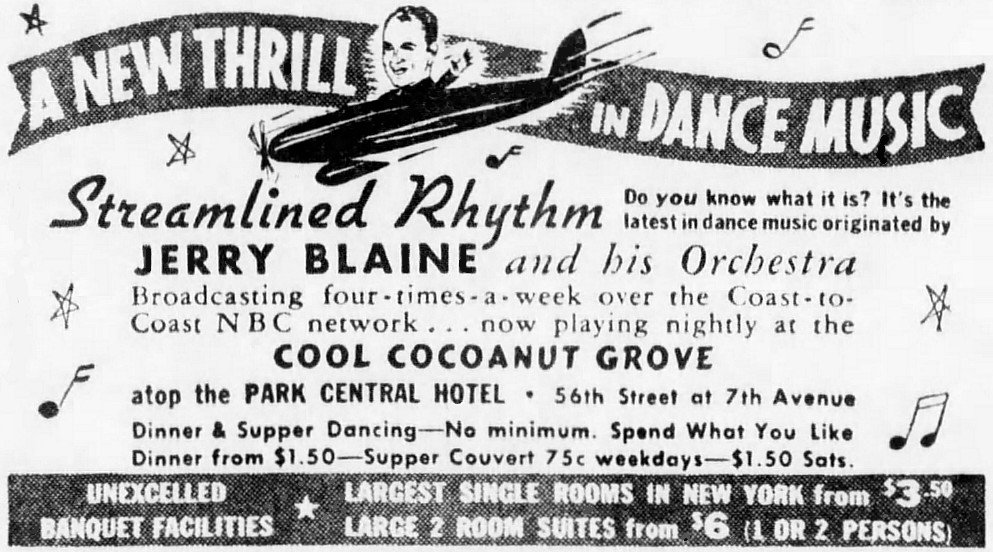
|
Above: BROOKLYN DAILY EAGLE, August 6, 1937:
BROOKLYN DAILY EAGLE, May 14, 1937:
....Jerry Blaine, orchestra leader at the Cocoanut Grove, has signed Phyllis Kenny, who sings and is pretty, too, to a three-year contract....At Direct Right: Phyllis Kenny (Detroit Free Press dated 6/16/38)
At Far Right: Jerry Blaine (Indianapolis Recorder 10/9/40)
BROOKLYN DAILY EAGLE, August 21, 1937:
Jerry Blaine will make a series of shorts at Paramount's Astoria Studios featuring the singing of Phyllis Kenny (see photo at right) and Blaire's rhythm orchestra, which appears at the Park Central Cocoanut Grove. It will be Blaine's first motion picture since he played the part of a pilot in "Wings" while a student at Stanford. His other pictures on the Coast included "Sweeter Than Sweet" and "Spirit of Notre Dame."(NOTE: IMDB.com shows only the 1938 musical short, "You Took The Words Right Out Of My Heart", with the credited cast consisting of Jerry Blaine and Phyllis Kenny.)
BROOKLYN DAILY EAGLE, January 21, 1938:
"Hollywood on Parade," the fast-moving musical revue staged by Boots McKenna and now current at the Cocoanut Grove atop the Park Central Hotel, is breaking all records for attendance at this rendezvous....The music is by Jerry Blaine and his orchestra, with Phyllis Kenny as vocalist.BROOKLYN DAILY EAGLE, August 15, 1937: UP IN THE AIR WITH JERRY BLAINE
Jerry Blaine, a licensed pilot, flew in the (movie) "Wings".... (and would hum along with the drone of the airplane motor while flying)....(Later on,) his first idea was to build an airplane large enough to accommodate his band and the drummer (on the stage)....flying around the Cocoanut Grove harmonizing with the airplane motor. On second thought, Jerry concluded that while the airplane would be very convenient on tours, hotel managers might object to having their dance floors cluttered up. He settled on an airplane motor, a miniature one at that....The motor was finished, functioned with admirable fluidity, and that, little children, was how streamline rhythm was born (harmonizing with the drone of the motor)....
A Stanford graduate, Jerry Blaine's first love was Hollywood. After "Wings," he formed his own band and played the Pacific Coast, before going on tour which took in Chicago, Pittsburgh, and Kansas City. He opened at the Park Central Cocoanut Grove last December, a month before the airplane motor idea. He is heard over WEAF four times a week, the only orchestra leader in the country hitting the airwaves so often. Last week was his fifth anniversary as a band leader.
(NOTE: "Wings" is a 1927 silent film starring Clara Bow, Charles "Buddy" Rogers, and Richard Arlen, including a smaller part by Gary Cooper. The movie featured aerial stunt flying. It's the first film to win a Best Movie Academy Award.)
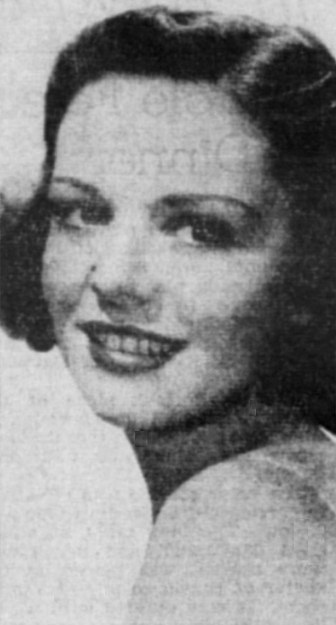
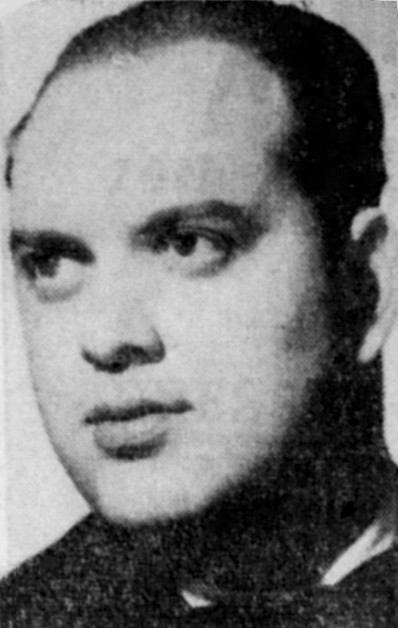
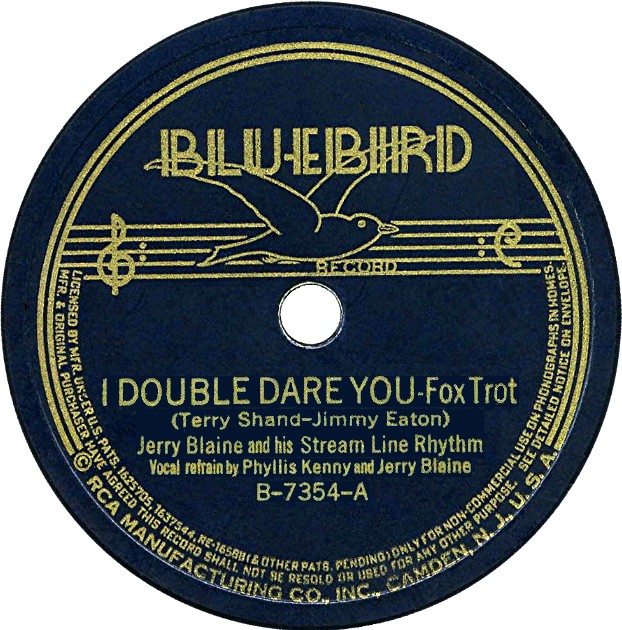
|
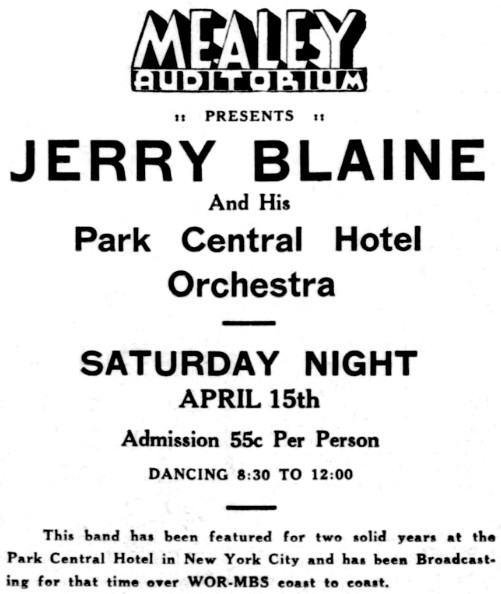
|
Above Left: Label image for Bluebird B-7354-A, recorded on December 17, 1937 and released in 1937. Jerry Blaine "sings" on this song and Phyllis Kenny accompanies him. There are short sections in this song that simulate an aircraft engine (see the "Up In The Air" newspaper article above). Above Right: MORNING CALL (Allentown, PA), April 14, 1939.
LISTEN: (Windows Media Player)
"I Double Dare You" - Jerry Blaine And His Stream Line Rhythm - Bluebird B-7354-A - 1937.
(Vocal refrain by Phyllis Kenny and Jerry Blaine)
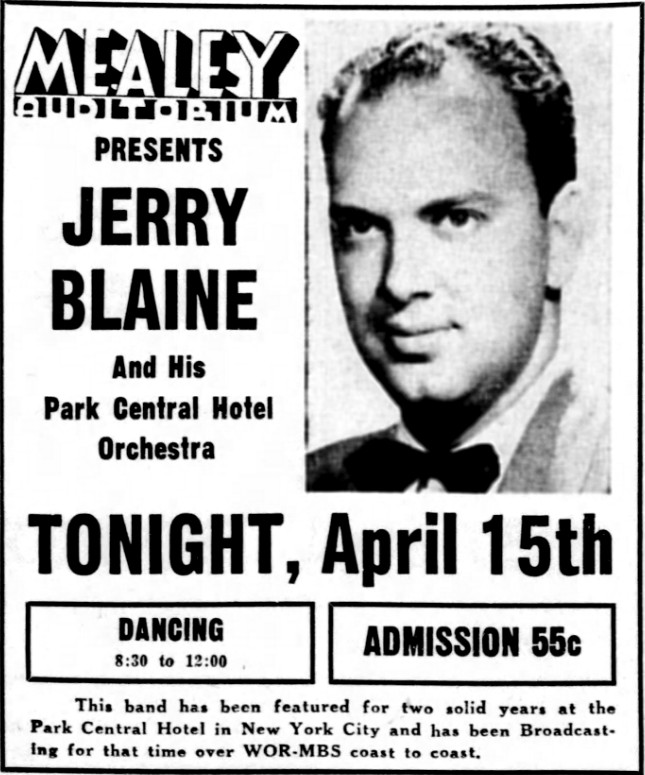
|
Above: MORNING CALL (Allentown, PA), April 15, 1939. MORNING CALL (Allentown, PA), April 15, 1939: BLAINE AT MEALEY'S
Jerry Blaine and his orchestra [see above clipping] will be the featured attraction at the Mealey auditorium on Saturday evening. This band has been featured for two solid years at the Park Central Hotel in New York City and has been broadcasting for that time over WOR-MBS coast to coast.
JUBILEE RECORDS THE BILLBOARD, March 30, 1946: JERRY BLAINE'S OWN PLATTERY
NEW YORK—Jerry Blaine, erstwhile sales manager for Cosmopolitan Records, is starting a diskery of his own. Company and name not yet set, tho Blaine does have production facilities lined up and expects to get started shortly.Cute twist in Blaine plattery operation is fact that music publisher Gil Mills is acting as press agent for Blaine. He sent out first announcement on Blaine's plans this week in regular tub-thumper [noisy promoter] release style, but on Gil Mills Music stationery.
THE CASHBOX, March 3, 1947: JERRY BLAINE RESIGNS FROM NATIONAL RECORDS
NEW YORK—Jerry Blaine, national sales manager of National Records, announced this past week that he will leave that label effective February 18th. It is understood that Blaine's resignation was tendered on the "friendliest of terms," and he chose to leave in order to devote more of his time to "other business interests."One of the those "interests" is known to be Cosnat, local record distributing firm, and also the local sales point of National Records. Another "interest" is believed to be a new record label, for which, it is said, he has been lining up financial backing.
Prior to joining National, Blaine served as sales chief of Cosmo Records.
THE CASHBOX, August 7, 1948:
NEW YORK: ....Jerry Blaine, of Cosnat Distributors, all excited about a new group he's got. They're tagged The Orioles, with advance reports indicating some sensational song styling in the offing for music operators....At Right Side Top: Label image for Jubilee 3502-A, released in 1947. Lee Tully was co-composer of "It Seems So Long Ago", released by The Orioles on Jubilee 5002 in February 1949. It's included in The Orioles' section just below.
THE BILLBOARD, October 30, 1948: BLAINE, De MAY FORM JUBILEE MUSIC PUB'RY
NEW YORK—Jerry Blaine, Cosnat distribber, and Sid De May, Natural Records prexy, have formed a pubbery, the Jubilee Music Company, to publish tunes out of the Natural catalog.Deborah Chessler, who penned It's Too Soon To Know, has been signed to a five-year writing pact with Jubilee, and the Orioles, whose platter of the tune is now riding high in race lists, have entered into a five-year recording contract with Natural.
Too Soon will not figure in the Jubilee deal, Miss Chessler having sold the number to the Buddy Morris pubbery some weeks ago for a reported $7,000. The Orioles' forthcoming Natural release, due next week, features a new tune by Miss Chessler.
(NOTE: The Orioles' next record, "Dare To Dream"/"To Be To You", was released on Jubilee 5001 in November 1948. Chessler co-composed the latter side.)
*****************************************************************************************
Per Galen Gart's book, "American Record Label Directory", the Jubilee label was originated by Herb Abramson circa May 1946. Jerry Blaine acquired the label from Abramson circa September 1947. Abramson and Blaine both worked at National Records in 1946 and early 1947. Abramson, of course, became president and co-owner of Atlantic Records at its start in 1948.
Jerry Blaine started his ownership of Jubilee Records releasing Yiddish novelty [comedy] records. This resulted in a hit, "Essen - Parts I and II", by Lee Tully in late 1947.
Then Blaine became involved with Natural Records, a New York City company run by Sid De May. Jerry Blaine re-issued It's A Natural 5000 ("It's Too Soon To Know"/"Barbra Lee") by The Orioles) as Jubilee 5000 in August 1948. He acquired Natural's catalog in November 1948 and Jubilee Records was on it's way to great and continuing success over the next decade.
Jubilee, even though an independent record company, focused mostly on popular records. Of course, the big exception was The Orioles vocal group. Jubilee did have some small amounts of blues, gospel, and country & western releases. But, to a greater extent, they catered to vocal groups. The result was several rather interesting releases in that category, noteably The Master Keys, The Sultans, The Marylanders, and The Five Sharps.
At Right Side Bottom: Label image for Jubilee 1001, released in May 1949.
Cash Box Review (5/7/49): THE ESQUIRES "Boppin' At Esquire"/"Idaboo" Jubilee 1001
Some light, polite bop wax in the offing for music ops are these sides done up by The Esquires. Coupling "Boppiní At Esquire" and "Idabop", the group displays loads of talent in this cookie, to set the stage for some winning coin-play. Itís light stuff, done up in a quiet manner that makes listening all the more pleasant. Music ops who have the locations that go for this brand should listen.LISTEN (Windows Media Player):
"Boppin' At Esquire (Instrumental)" - The Esquires - Jubilee 1001 - 1949.Jubilee had 1000, 3500, 4000, 5000, 6000, and 9000 numbering series. Jubilee 1001 (Jazz Corner Series) has a yellow label with blue print and a blue outside ring. Not sure if any other records were released in the 1000 series. The 3500 series is red or red-orange with silver printing and silver outside ring.
The main 5000 series started with an all blue label with silver printing and silver outside ring. It then switched to half blue and half pink with blue printing and musical notes two-thirds around the outside. The print style of "Jubilee" was changed and the "J" went to a lower-case "j". And it finally went to an all pink label with blue printing and the same outside ring of musical notes and the same "jubilee" print style.
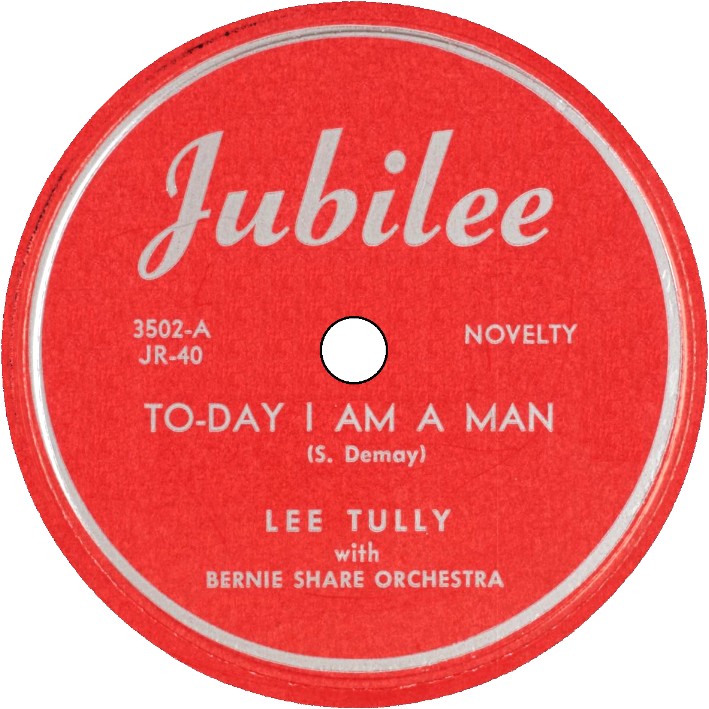
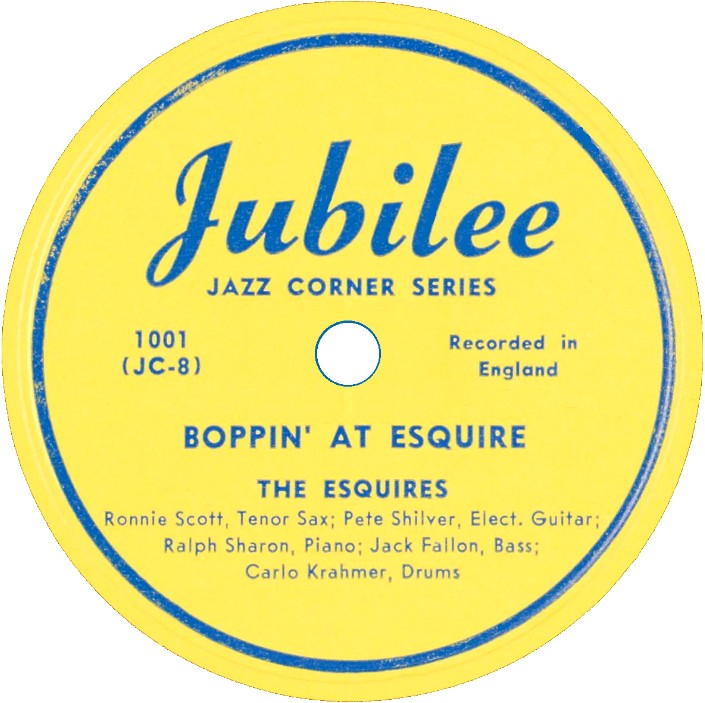
Above Left: Jerry Blaine with The Orioles from February 1950.... (L-R) George Nelson, Sonny Til, Alexander Sharp, Jerry Blaine, Tommy Gaither, and Johnny Reed.. Above Right: Label image for It's A Natural 5000, recorded in July 1948 and released in August 1948. Note the "JR" matrix number on the label. Jubilee retained the same label design and colors.
At Direct Right: An example of one of the 1948 "cover" records of "It's Too Soon To Know". Note the composer is shown as "Deborah-Chessler" with a hyphen, the same as the It's A Natural label. It's also done this way on the Jubilee label. The It's A Natural version was released in July 1948, The Jubilee in August 1948, and the Varsity in October 1948.
LISTEN (Windows Media Player):
1. "It's Too Soon To Know" - The Orioles - It's A Natural 5000 - 1948.
2. "It's Too Soon To Know" - Jimmie Valentine Quintet - Varsity 113 - 1948.BOTH SONGS played in sequence.
THE CASH BOX, August 28, 1948: PASS 30,000 FIRST WEEK
NEW YORK—Natural Records reported this past week that their initial release by The Orioles, "Barbra Lee" and "It's Too Soon To Know," which captured the "Race Disk Of The Week" in The Cash Box, August 21 issue, passed the 30,000 sales mark its very first week.Also interesting, the firm reports, is the fact that six different publishers are now bidding for the tune, "It's Too Soon To Know." It is expected that by the time this item reached print one of these firms will have closed a deal for the song.
NOTE: Others to release "It's Too Soon To Know" in 1948 include The Ravens (National), Charioteers (Columbia), Deep River Boys (RCA Victor), Jimmy Valentine Quintet (Varsity), Dinah Washington And Vocal Group (Mercury), Ronnie Deauville (Mercury), Ella Fitzgerald (Decca), Andy Russell And The Pied Pipers (Capitol), Marian Robinson (M-G-M), and Lee Richardson (King).
THE CASH BOX, October 23, 1948:
....Sid DeMay of Natural Records announces that all future releases of The Orioles, smash vocal combo who have hit pay dirt via their "Itís Too Soon To KnowĒ disking, will be on the Jubilee label....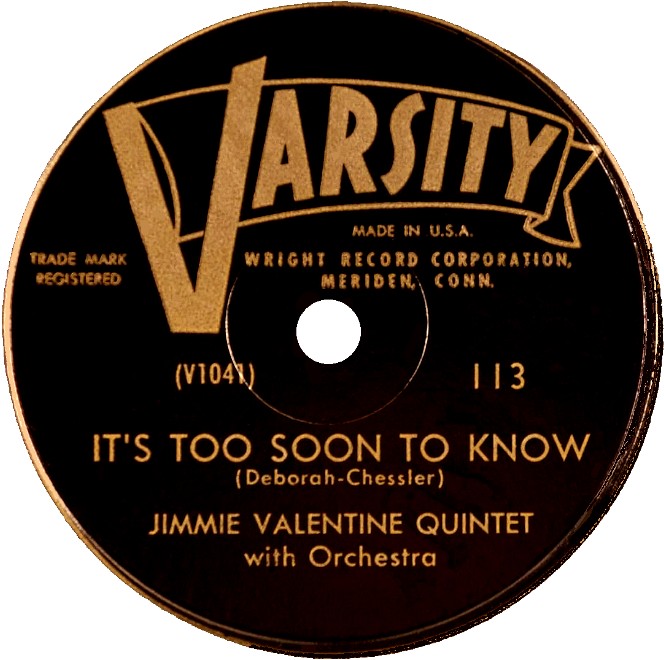
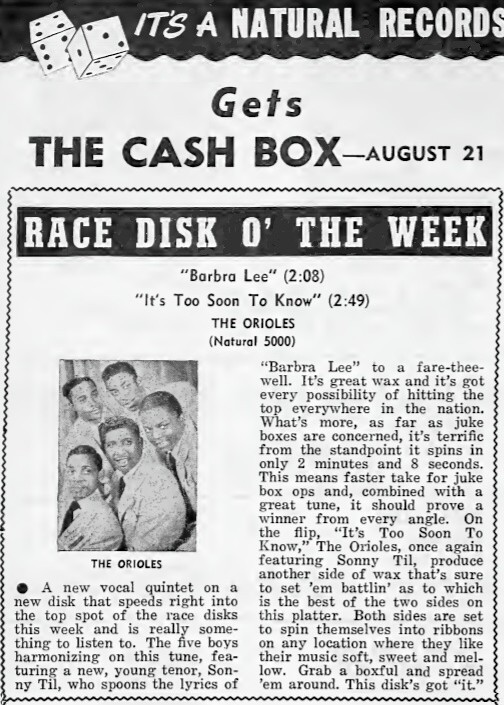
|
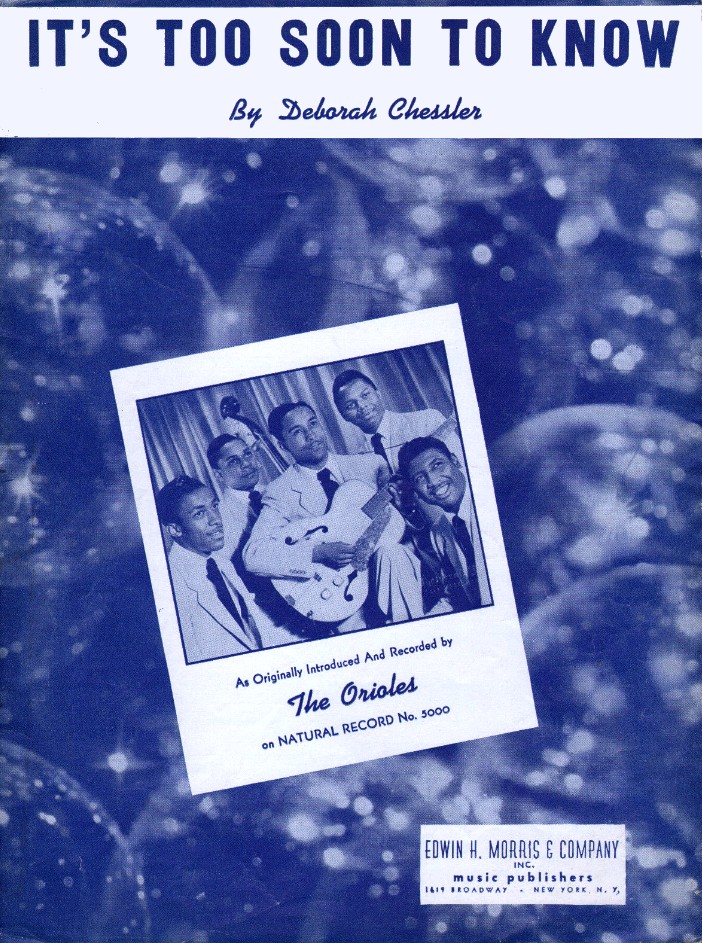
|
Above Left: CASH BOX - RACE DISK O' THE WEEK, September 11, 1948. Above Right: SHEET MUSIC for The Orioles and "It's Too Soon To Know".
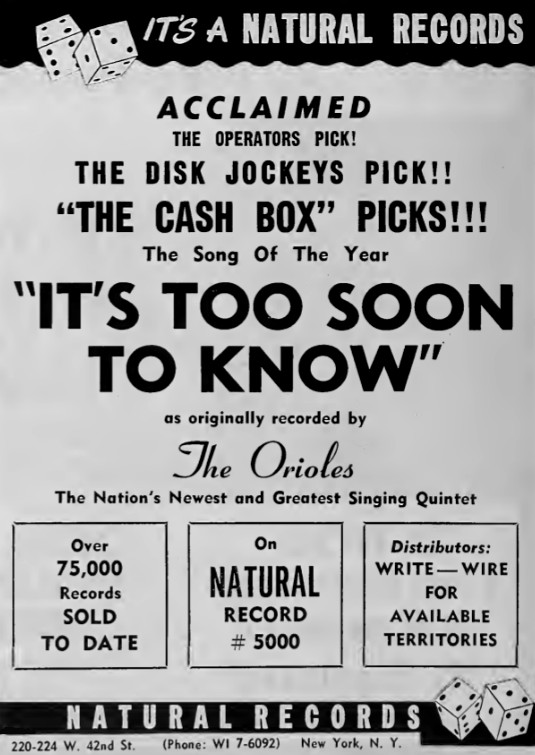
|
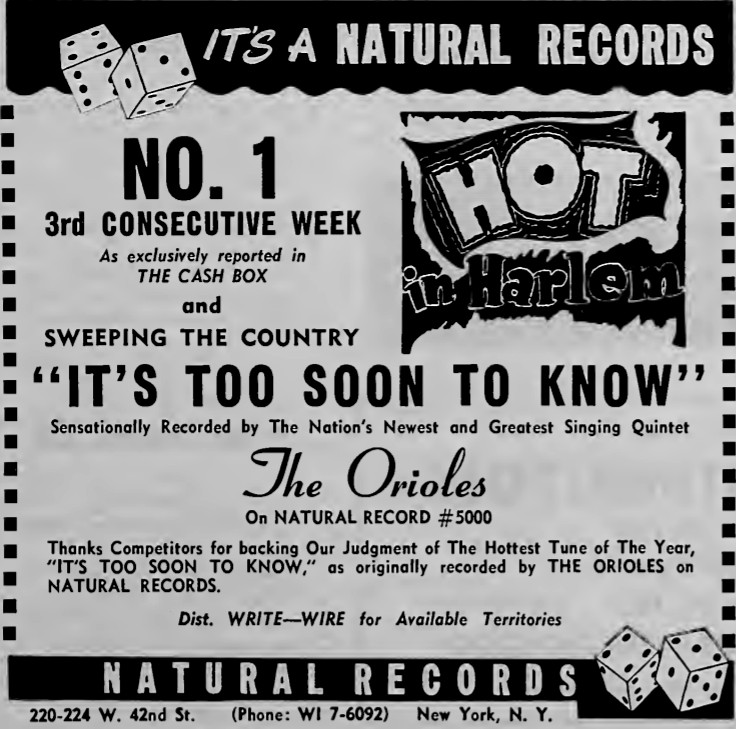
|
Above Left: CASH BOX, September 11, 1948.
NOTE: A "natural" is an unmodified roll of the dice. You get what you see.Above Right: CASH BOX, October 2, 1948.
THE ORIOLES
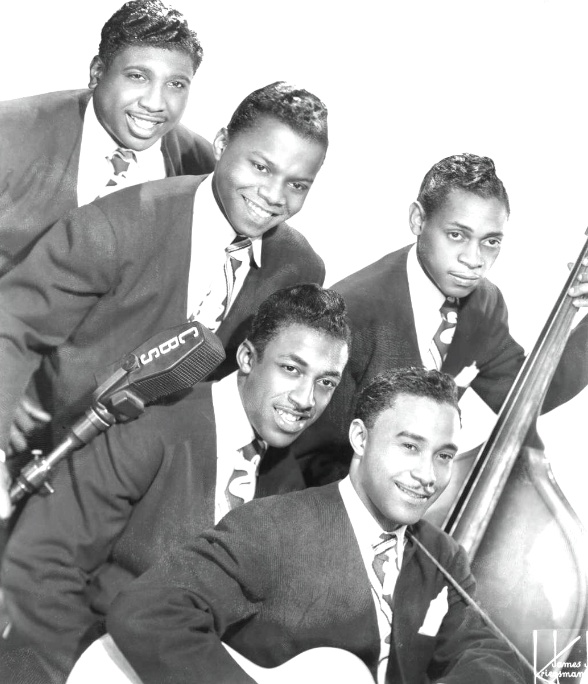
|
Above: Photo of The Orioles, (Top L-R) Alex Sharp (tenor), George Nelson (baritone), Johnny Reed (bass, bassist), (Bottom L-R) Sonny Til (lead tenor), and Tommy Gaither (tenor, guitarist). It is the line-up for The Orioles through Jubilee 5051, released in January 1951. The success of Jubilee Records was primarily due to the success of The Orioles. Their records were released on the Jubilee label from 1948 to 1956.
Click HERE for a multi-part article about The Orioles by Marv Goldberg. (Will open in a separate window)
CLEVELAND CALL AND POST, October 16, 1948;
SUCCESS FOR THE ORIOLES AS HIT NUMBER CLICKS
NEW YORK—One of the greatest success stories of the year is that of "The Orioles", distinctive new vocal group, whose smash hit recording of "It's Too Soon To Know" has skyrocketed them across the magical horizon almost overnight.It was just a few short months ago that "The Orioles" were working in an obscure night club in their native Baltimore for next to nothing in the way of financial compensation. They did, however, have a way of pleasing their audiences, especially with their rendition of "It's Too Soon To Know, which was written by an obscure Baltimore songwriter, Deborah Chessler.
Jerry Blaine, former bandleader who has seen service as a recording executive for several leading companies, happened to catch the group one night and immediately tabbed their version of "It's Too Soon To Know" as a surefire jukebox hit. As a matter of fact, he had so much confidence in what he had heard that he formed his own recording company, the Natural label, and went into business on the strength of the waxings he made with "The Orioles".
(NOTE: Sid De May owned Natural Records; Jerry Blaine owned Jubilee Records.)
Thanks to their disc of "It's Too Soon To Know", which is currently just about the hottest piece of wax in the nation's jukeboxes, "The Orioles" now rate upwards of $2000 a week for theater and nitery dates and have more offers of major bookings than they can possibly fulfill.
They've just wound up a record-breaking week at the Royal Theater in Baltimore, and currently headline on the stage of the 125th Street Apollo Theater in Harlem. They go into the Kingston Lounge, Brooklyn, N.Y., starting Friday, October 15, and then take the stage of the Howard Theater, Washington, D.C., the week of October 22.
[The above article was provided by Richard Koloda.]
INDIANAPOLIS RECORDER, March 5, 1949: ORIOLES ON TELEVISION
NEW YORK—The Orioles, whose recent hit records have skyrocketed them into the big money brackets, have become the latest musical attraction to register success in the new and rapidly expanding medium of television. The popular vocal group bowed into video via a guest shot on NBC's musical variety telecast, "Eddie Condon's Floor Show," and followed up with another appearance on disk-jockey Bill Cook's new "Club Caravan" on television station WATV.That the Orioles are a cinch for future video stardom was indicated by the reviews of their appearances, which hailed the Orioles as "the most entertaining and versatile of all vocal groups in a visual sense." Agent Billy Shaw is currently weighing several bids to sign the group for a regular television series.
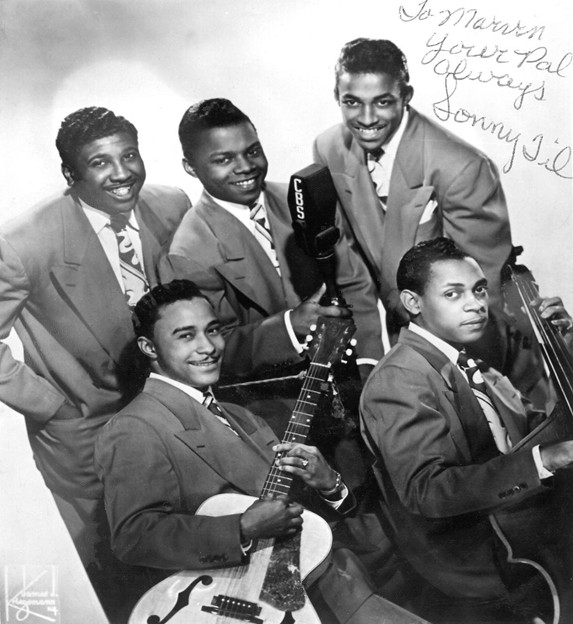
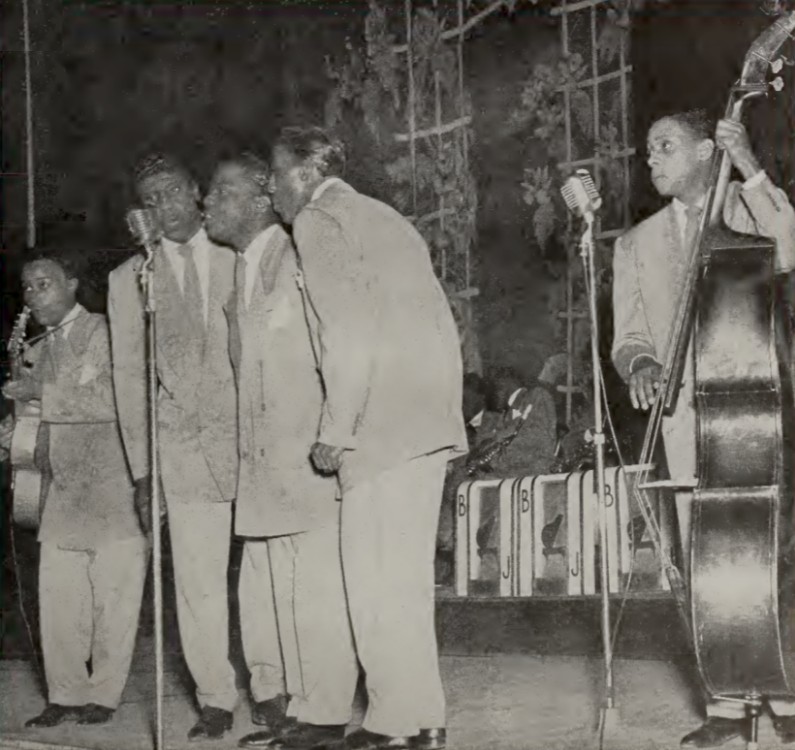
|
Above: CASH BOX COVER, December 18, 1948.
CAPTION: Music operators throughout the nation can thank The Orioles, pictured above, for giving them one of the hottest hits this past year. Their sensational recording of "It's Too Soon To Know" caught on like wild fire, and since then has sky-rocketed the vocal combination to the forefront of the music world.
Pictured above, left to right, Tommy Gaither, Alex Sharp, George Nelson, Sonny Til, and John Reed, during a recent engagement at the Paradise Theatre, Detroit, Mich. The group is continuing their meteoric rise to fame and success via their current smash personal appearance tour.
The Orioles are exclusively featured on Jubilee Records. Direction: Billy Shaw. Personal Management: Jerry Blaine. Press Relations: Jim McCarthy.
(NOTE: The Orioles' personal manager was Deborah Chessler. It's the Buddy Johnson Orchestra behind them.)
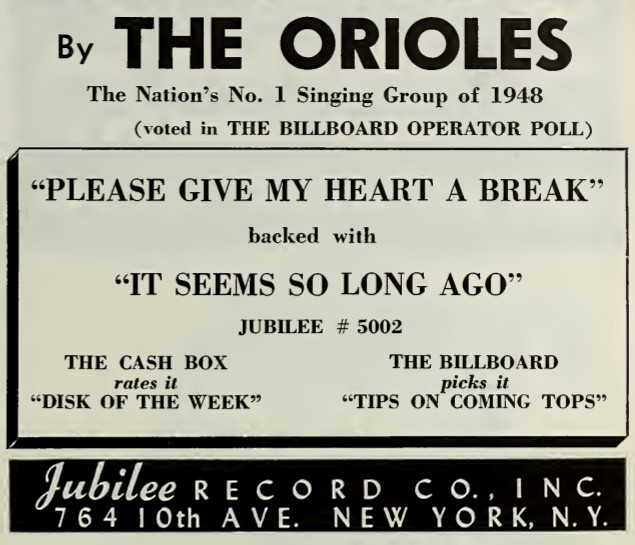
|
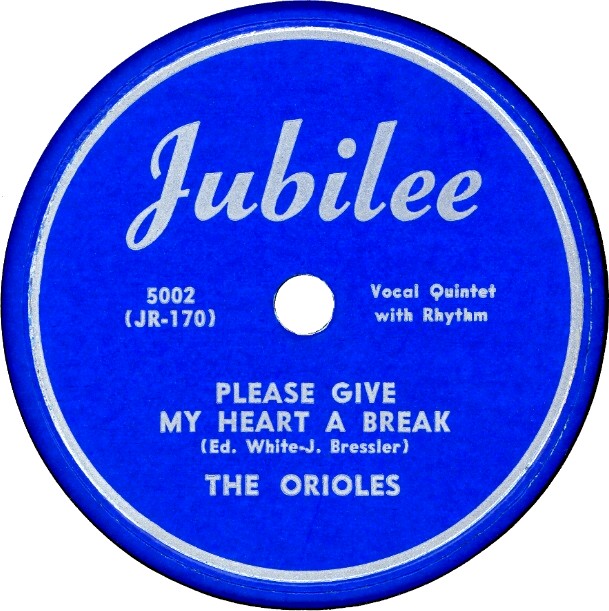
|
Above Left: CASH BOX, February 5, 1949. Above Right: Label image for Jubilee 5002, released in February 1949. As was The Orioles' standard format for ballads, Sonny Til sings the main lead and George Nelson sings the bridge part.
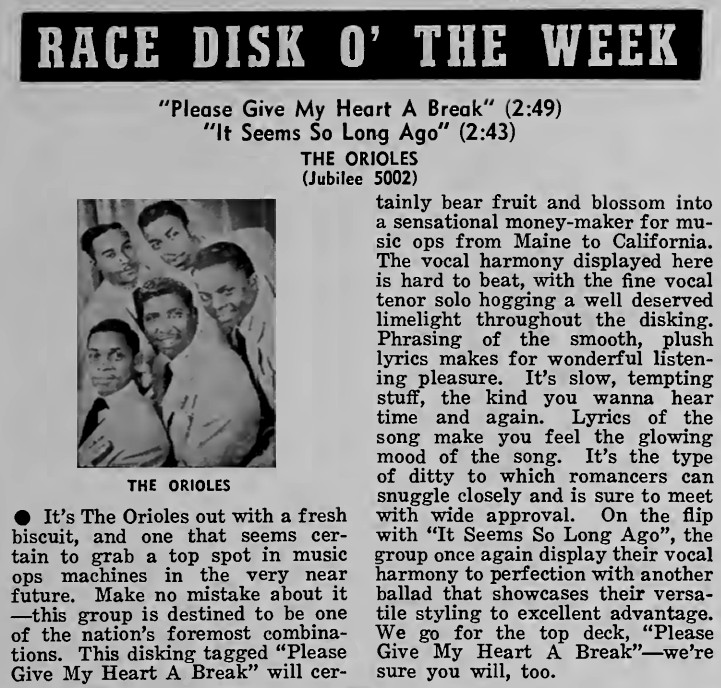
|
Above: CASH BOX - RACE DISK O' THE WEEK, January 29, 1949.
LISTEN (Windows Media Player):
1. "Please Give My Heart A Break" - The Orioles - Jubilee 5002 - 1949.
2. "It Seems So Long Ago" - The Orioles - Jubilee 5002 - 1949.BOTH SONGS played in sequence.
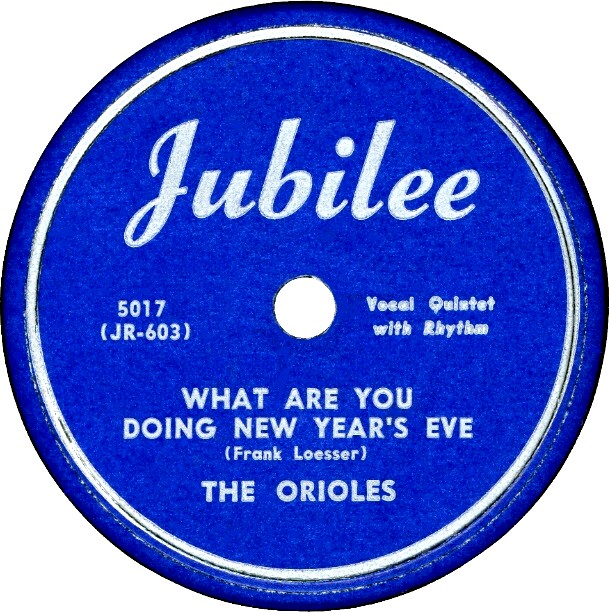
|
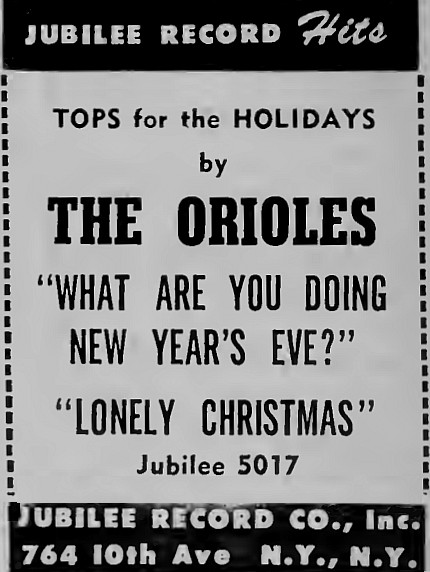
|
Above Left: Label image for Jubilee 5017, released in November 1949. The flip side, "Lonely Christmas", was previously issued by The Orioles on Jubilee 5001 in November 1948. Note the "JR-603" matrix number. The matrix numbers for The Orioles' records after Jubilee 5005 (1949) jumped around using 200, 230( ), 250( ), 280( ), 300, 400, 600, and 900 series, switching over to the new "JB-" prefix at Jubilee 5102 (1952).
Above Right: CASH BOX, December 10, 1949.
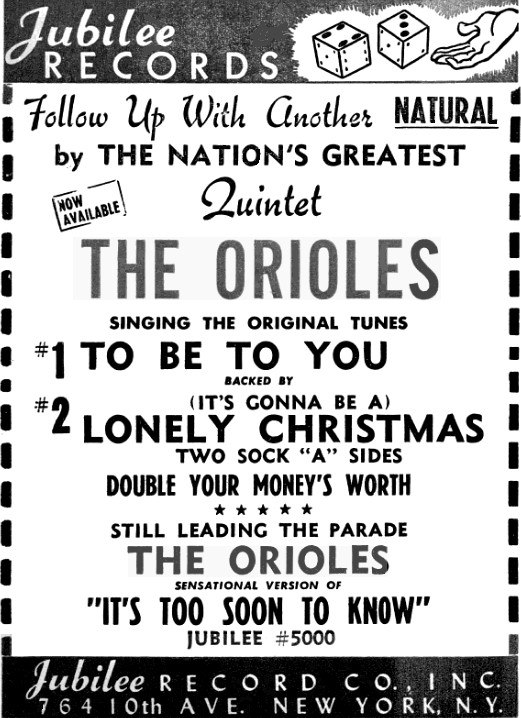
|
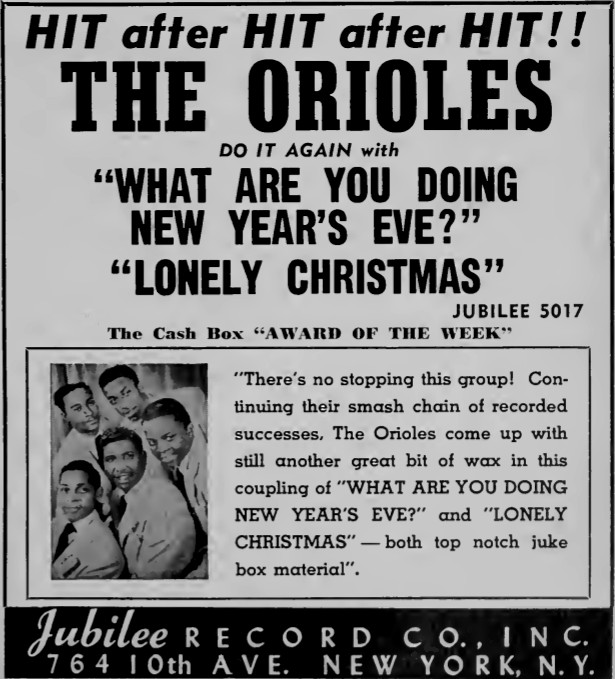
|
Above Left: THE BILLBOARD, December 13, 1948.
(Note the reference to "Natural" and the dice similar to the Natural Records' ads.)Above Right: CASH BOX, December 17, 1949.
LISTEN (Windows Media Player):
1. "What Are You Doing New Year's Eve" - The Orioles - Jubilee 5017 - 1949.
2. "Lonely Christmas" - The Orioles - Jubilee 5017 - 1949.BOTH SONGS played in sequence.
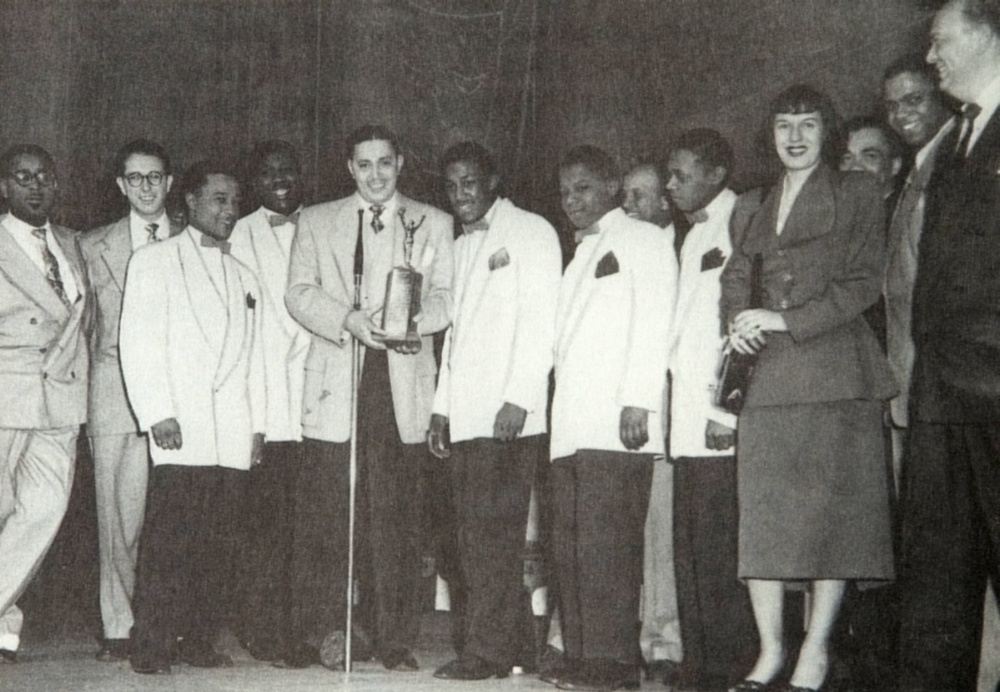
|
Above: The Cash Box Cover 3/5/50.
CAPTION: The high-flying Orioles are pictured above admiring the trophy awarded them on stage of the Apollo Theatre, New York, by the disk jockeys in recognition of their tremendous popularity....Pictured above are left to right: Dizzy Gillespie; Ray Carroll [WHOM]; Willie Bryant [WHOM]; The Orioles; song-writer Deborah Chessler; and Jerry Blaine, president of the Jubilee plattery. (NOTE: Bryant is holding the trophy. The Orioles huddled around him, in white jackets and bow ties, are (L-R) Tommy Gaither, Alexander Sharp, Sonny Til, George Nelson, and Johnny Reed. Blaine is at far right. In back between Nelson and Reed is Harold Jackson [WLIB]. In back between Chessler and Blaine are Bill Cook [WAAT] and Phil "Trash" Gordon [WWRL.)
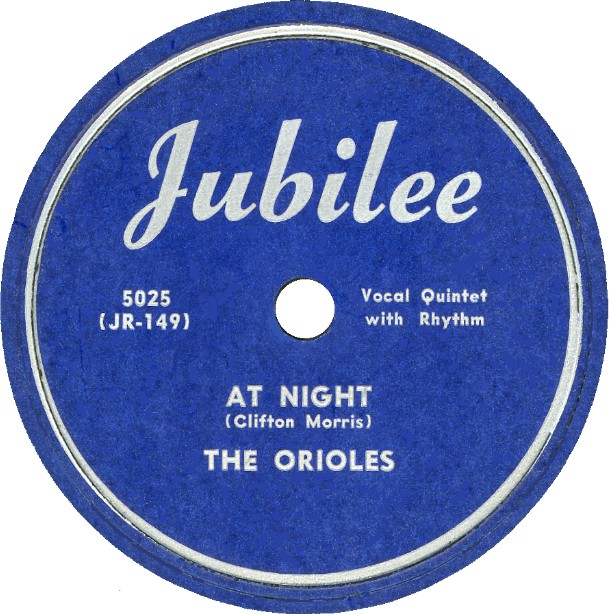
|
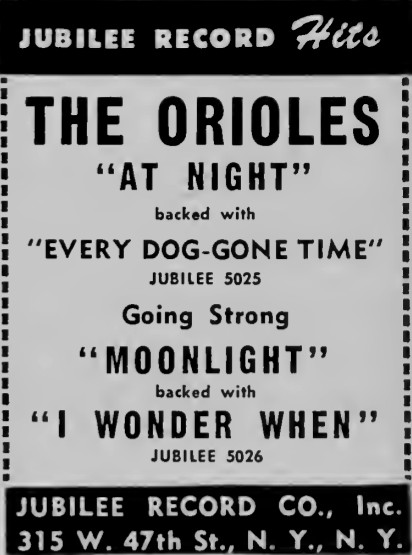
|
Above Left: Label image for Jubilee 5025, released in March 1950. "At Night" was recorded in July 1948. Note that the matrix number (JR-149) is earlier than "Barbra Lee" (JR-150) and "It's Too Soon To Know (JR-151). Interesting that they waited so long to release such a great song. Above Right: CASH BOX, December 10, 1949.
The Billboard Review (4/8/50):
THE ORIOLES — Jubilee 5025
At Night (85) Chalk up another hit for the high flying group. Tune is standout; group delivers one of their best jobs yet.
Every Dog-Gone Time (70) Ordinary ballad is paled by flip; lacks tensions and mood created on overside.
(NOTE: Ratings had a range of 0-100 with 70-79 considered as "good" and 80-89 as "very good".)LISTEN (Windows Media Player):
1. "At Night" - The Orioles - Jubilee 5025 - 1950.
2. "Every Dog-Gone Time" - The Orioles - Jubilee 5025 - 1950.BOTH SONGS played in sequence.
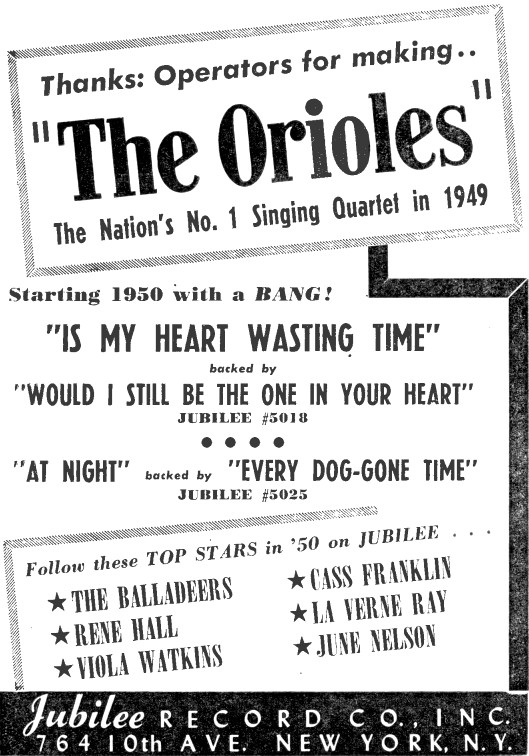
|
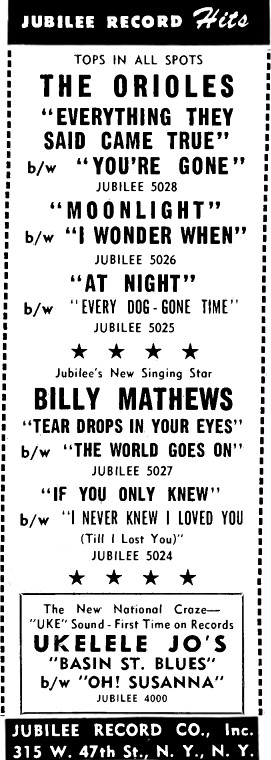
|
Above Left: THE BILLBOARD, March 4, 1950. Above Right: CASH BOX, July 8, 1950.
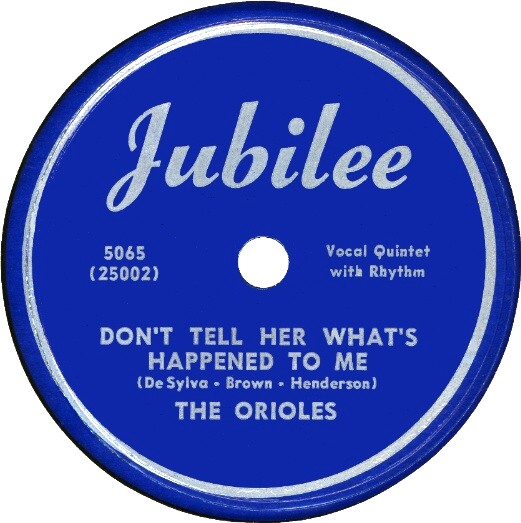
|
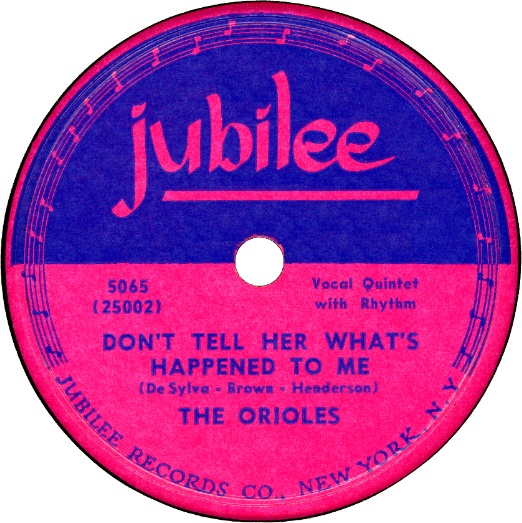
|
Above: Label images of Jubilee 5065, recorded on September 6, 1951 and released in October 1951. As shown, it came out on the blue label and also the later design pink and blue label. The line-up for this record, and continuing on through Jubilee 5115, is Sonny Til, George Nelson, Alexander Sharp, Charlie Harris, and Ralph Williams.
LISTEN (Windows Media Player):
"Don't Tell Her What's Happened To Me" - The Orioles - Jubilee 5065 - 1951.
"Baby Please Don't Go" - The Orioles - Jubilee 5065 - 1951.BOTH SONGS played in sequence.

|
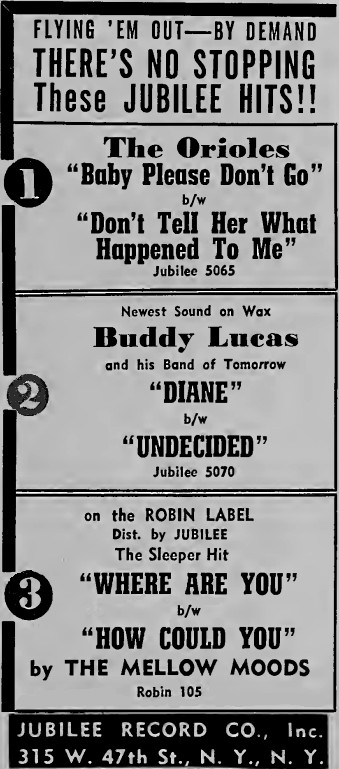
|
Above Left: CASH BOX, January 12, 1952. Above Right: CASH BOX, January 19, 1952.
EXTRA RECORDS
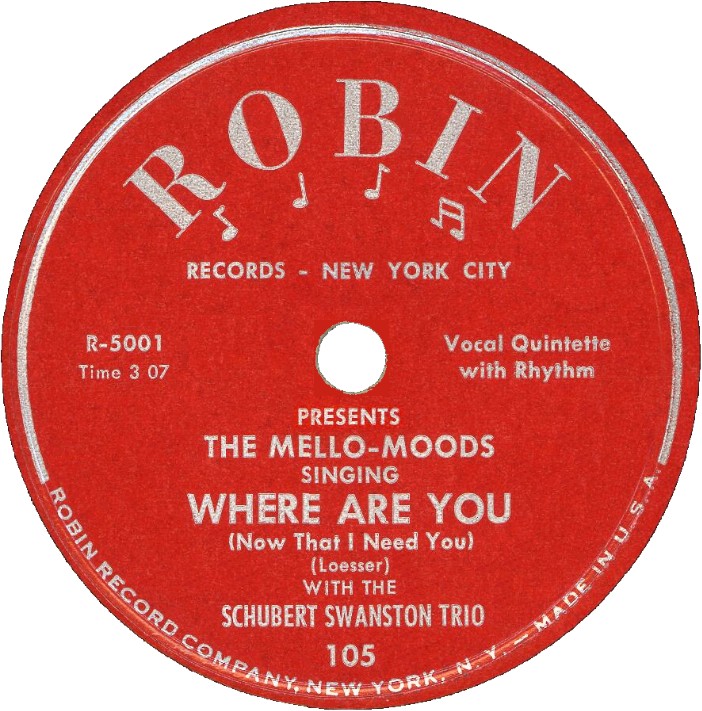
|
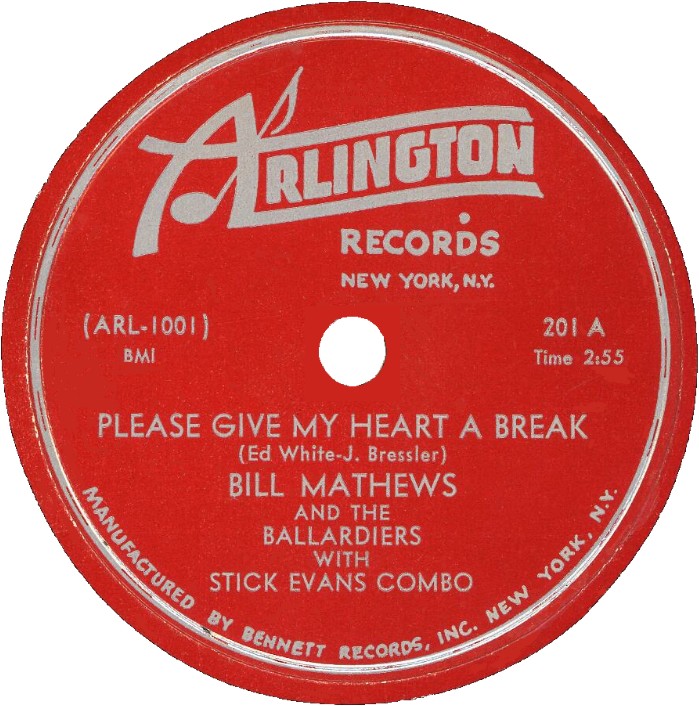
|
Above Left: Label image of Robin 105, released in December 1951. At this time, Jubilee was serving as (Red) Robin's distributor. Above Right: Label image of Arlington 201 A, released in March 1949. This is the same song as shown further above by The Orioles, which had been released in February 1949.
Arlington was a New York City label owned by George J. Bennett. Bandwagon (Ann Cornell and The Rhythm Masters) was an affiliated label. Bennett also owned the Bennett label (The Rhythmasters).
At Direct Right: Jubilee Ad - February 1952.
NOTE: Again, The Mello-Moods' name is spelled incorrectly as "The Mellow Moods".JUBILEE'S FLYING DISKS
NEW YORK, Jan. 5, 1952—Jerry Blaine, Jubilee Records prexy, is currently so hot with his releases that he revealed he is being forced to ship copies to the Midwest by air.The three disks which are causing all the fuss are "Baby Please Don't Go" by the Orioles, "Diane" by Buddy Lucas, and "Where Are You" by the Mellow Moods [sic] on the Robin label.
The unprecedented demand has Jubilee disks climbing fast on all the charts.
Cash Box Review (1/12/52):
THE MELLO-MOODS "Where Are You"/"How Could You" Robin 105
An oldie is given a new lift, rhythm and blues style, by the singing Mello-Moods. With an echo chamber affect and the backing of the Schubert Swanston Trio, this lid can make noise. The under level is similar to the top side in treatment and it too sounds good. We think itís the upper half.The Billboard Review (4/2/49):
BILL MATHEWS AND THE BALLARDIERS — Arlington 201
Please Give My Heart A Break (71) Pleasing ballad was introduced previously by the Orioles. Lad here delivers with a fine deep baritone that could have registered stronger if he had pulled out the stops stylistically.
Rock And Roll (72) Mathews allows versatility as he shouts and scats this lively jump opus. Blurry recording dulls the edge here.
(NOTE: Ratings had a range of 0-100 with 70-79 considered as "good".)LISTEN (Windows Media Player):
1. "Where Are You" - The Mello-Moods - Robin 105 - 1951.
2. "How Could You" - The Mello-Moods - Robin 105 - 1951.
3. "Please Give My Heart A Break" - Bill Mathews And The Ballardiers - Arlington 201 A - 1951.
4. "Rock And Roll" - Bill Mathews And The Ballardiers - Arlington 201 B - 1951.ALL FOUR SONGS played in sequence.
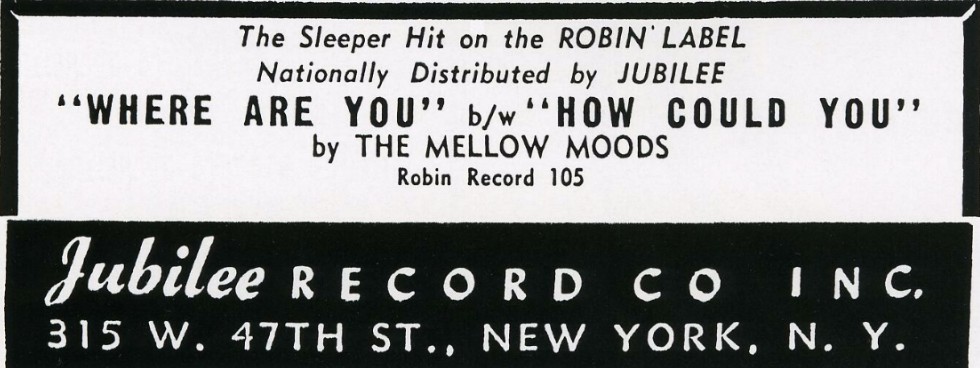
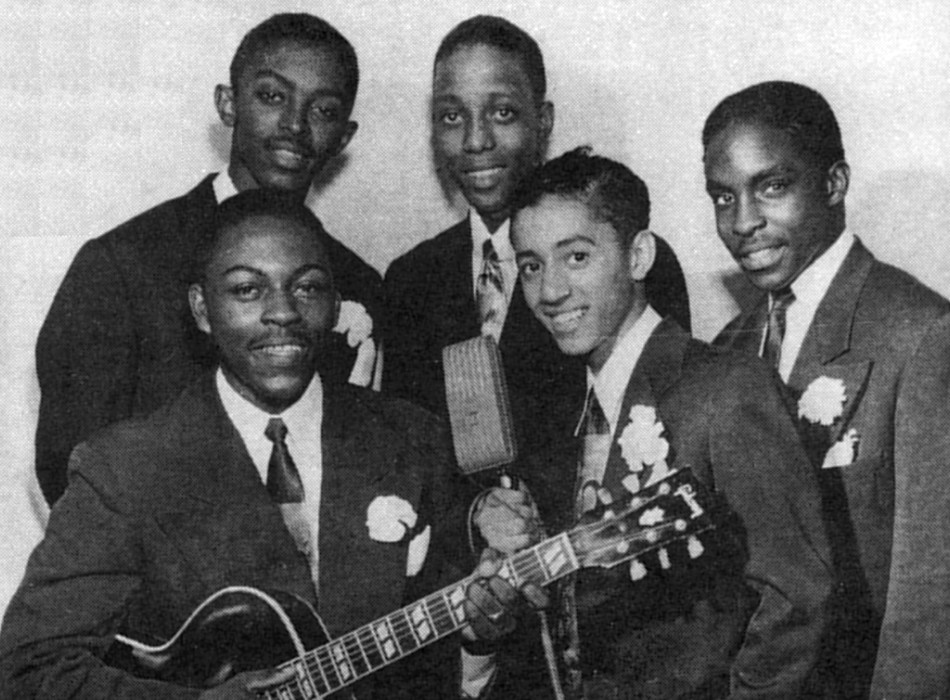
|
Above: Photo of The Mello-Moods, (Back L-R) Jimmy Bethea (bass), Bobby Baylor (tenor & baritone), (Front L-R) Monte Owens (tenor, baritone & guitar), Ray "Buddy" Wooten (lead tenor), and Bobby Williams (second tenor & piano). The two Bobby's and Monte later joined in forming The Solitaires. Joel Turnero, The Mello-Mood's manager, composed the flip song "How Could You?". Buddy Wooten sings lead and Bobby Williams second lead on both of these sides. The group had a total of four records released, two on Robin/Red Robin (1951-52) and two on Prestige (1952-53).
Robin, later to become Red Robin, was a New York City label owned by Bobby Robinson.
Click HERE for an article about The Mello-Moods by Marv Goldberg. (Will open in a separate window)
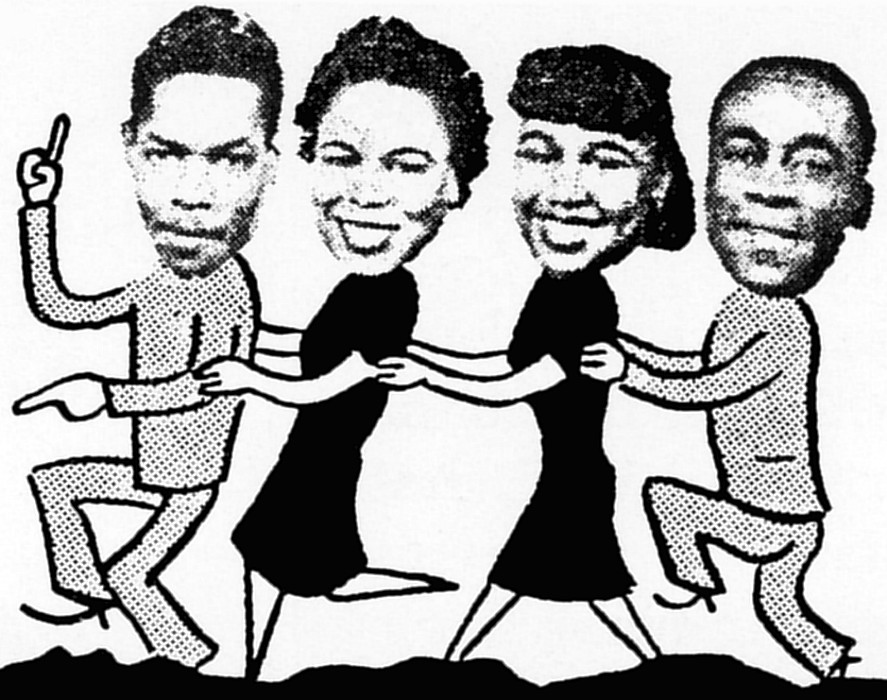
|
Above: Photo of Bill Mathews And The Ballardiers, also known as "Billy Mathews And The Balladeers" (Jubilee, Mercury, & Wrimus), "The Balladeers" (Jubilee), and "The Balladiers" (Jubilee). Their record on Wrimus, a Hollywood, CA, label, was one side in 1956. Including one record backing Cliff Ayers, they had three releases on the Jubilee label (1950-1951).
Above Left: Label image of Jubilee 5021, released in February 1950. BMI credits "Billie Mathews" as composer of this song. Above Middle: Label image of Jubilee 4060, released in July 1951. The Balladiers back Cliff Ayers on both sides. Released in Jubilee's 4000 series with an all-pink label.
Above Right: Label image of Decca 27808, released in October 1951. Both sides were acquired from Jubilee Records. The flip-side of the Decca record, "Birds Of A Feather", is a solo effort by Cliff Ayers.
At Direct Right: Jubilee Ad - January 1950.
CASH BOX, January 14, 1950:
....The Balladeers, a new vocal quartet, recorded four sides for Jubilee Records last week....Cash Box Review (1/28/50): THE BALLADEERS "Red Sails In The Sunset"/"It Ain't Right" Jubilee 5021
New vocal group bows on Jubilee wax, with the refrain of "Red Sails In The Sunset" and "It Ainít Right" seeping thru the platter. Harmony this group displays is top notch right from the very start. They turn in a wonderful job on the top deck, a well known standard. The flip picks up in tempo a bit, with the lyrics spinning around the title.
Side to ride with is "Red Sails In The Sunset".The Billboard Review (10/20/51):
CLIFF AYERS (Balladiers) — Decca 27808
I'll Wait For You (85) This was formerly a Jubilee record which showed some promise; now with Decca, this strong waltz in the "My Heart Cries for You" vein could attract important attention.Ayers sings it persuasively and really sells with his homey quality. Lad sounds like a comer. Disking could crop up a "sleeper".
(NOTE: Ratings had a range of 0-100 with 80-89 considered as "very good".)
LISTEN (Windows Media Player):
1. "It Ain't Right" - The Balladeers - Jubilee 5021 - 1950.
2. "Red Sails In The Sunset" - The Balladeers - Jubilee 5021 - 1950.
3. "I'll Wait For You" - Cliff Ayers And The Balladiers - Jubilee 4060 - 1951.
4. "It's You, It's You, It's You" - Cliff Ayers And The Balladiers - Jubilee 4060 - 1951.ALL FOUR SONGS played in sequence.
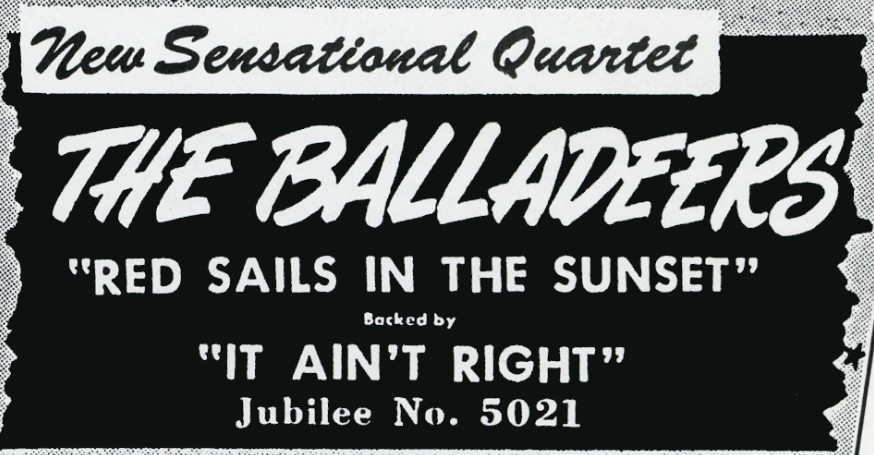
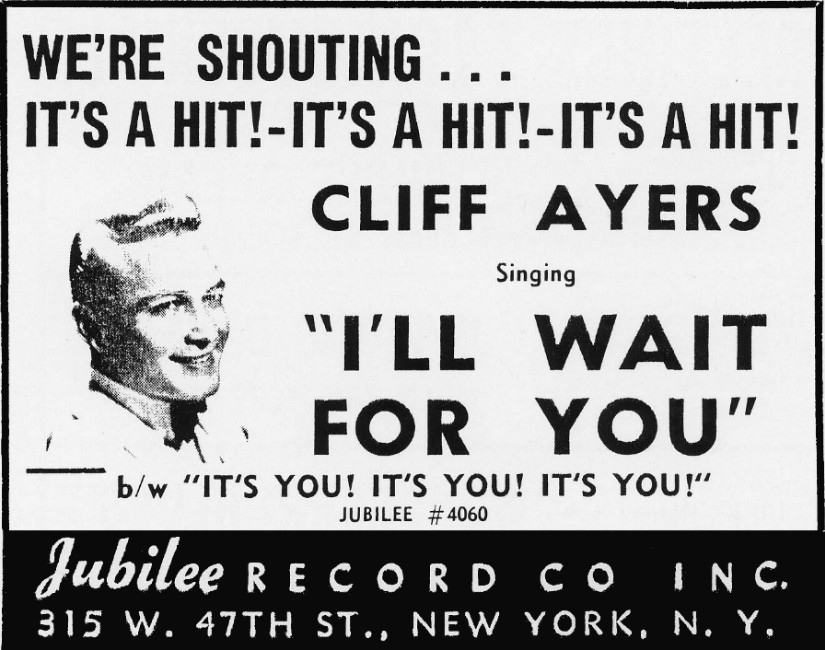
|
Above: Jubilee Ad - July 1951.
Note the clever lead-in (It's A Hit!...) mimicking the song title (It's You!...).
THE MASTER KEYS
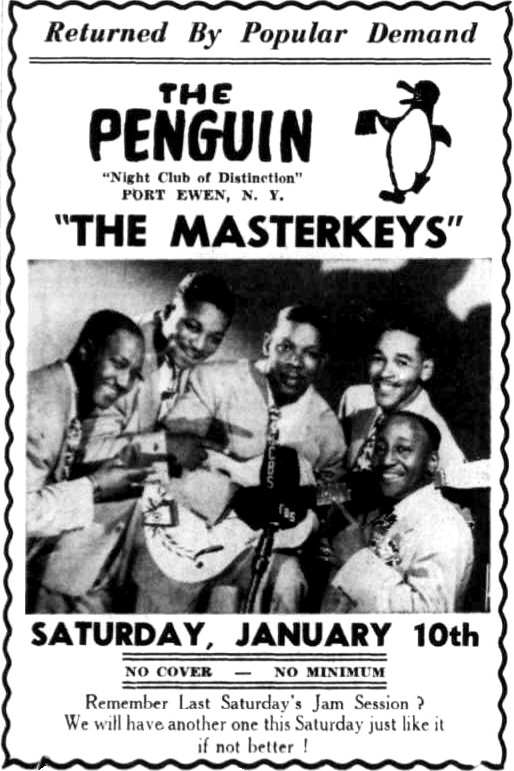
|
Above: KINGSTON DAILY FREEMAN (Kingston, NY), January 9, 1948.
NOTE: The Master Keys in the picture are (L-R) Melvin Colden (baritone), Norman "Crip" Harris (2nd tenor), Claude Chandler (guitarist), J. B. Nelson (bass), and Johnny Moore (1st tenor). This is the line-up that Disco-File gives for both the Top and Jubilee records. It is an old 1945 photo, with not up-to-date members for January 1948.
Click HERE for an article about The Master Keys by Marv Goldberg. (Will open in a separate window)
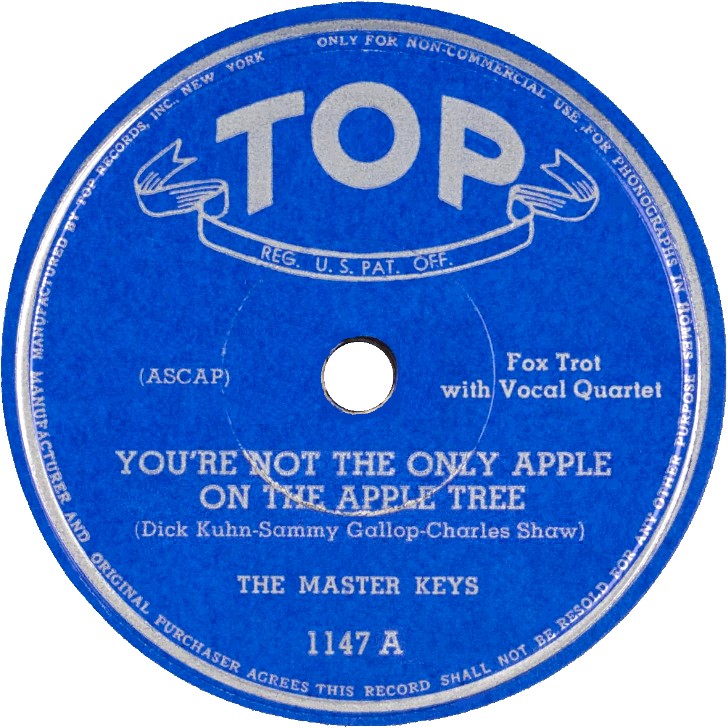
|
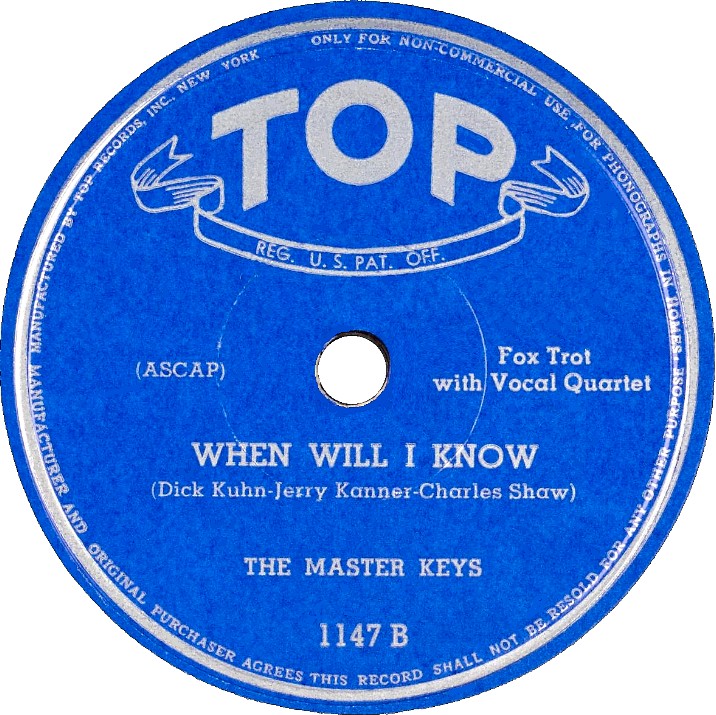
|
Above: Label images for both sides of Top 1147, released in July 1945. The Master Keys had one other record on the Top label, "How Can I Explain"/"I Got The Blues In The Mornin'", this released on Top 1146 A/B in December 1945. They were issued out of sequence. "Dick Kuhn", who has writer's credit on all four sides, was the owner of Top Records. Both records, by arrangement with Top Records, were released on the 20th Century label in October 1946.
LISTEN (Windows Media Player):
1. "You're Not The Only Apple On The Apple Tree" - The Master Keys - Top 1147 A - 1945.
2. "When Will I Know" - The Master Keys - Top 1147 B - 1945.
3. "I Got The Blues In The Mornin'" - The Master Keys - Top 1146 B - 1945.
4. "How Can I Explain" - The Master Keys - Top 1146 A - 1945.ALL FOUR SONGS played in sequence.
Above Left: THE BILLBOARD, October 20, 1945. Above Right: CASH BOX, February 6, 1949.
CASH BOX, February 26, 1949:
....Jubilee Records acquired several masters of The Master Keys from Top Records....THE BILLBOARD, March 5, 1949:
....Jubilee Records acquired four masters from Dick Kuhn's Top records; sides were cut by vocal group, the Master Keys....At Direct Right: Label image of Jubilee 5004, released in April 1949. Jubilee did not issue the other two sides.
CASH BOX, April 9, 1949:
JUBILEE RECORDS OFFER REWARD FOR LOCATION OF MASTER KEYS QUARTET
NEW YORK—Jubilee Records, Inc., this city, this past week disclosed the offer of a $500.00 reward for the location of the Master Keys Quartet. The Keys, who bowed in 1945 have bowed out since then. Several platters they made then have caught on with music fans.Masters were taken over by Jubilee, with the latter firm intent on finding the group. Their recording of "I Got The Blues In The Morniní" and "Youíre Not The Only Apple On The Apple Tree" is currently winning wide favor. Names of the boys are: J. B. Nelson, Melvin Golden, Norman Harris, and J. M. Moore.
Cash Box Review (4/23/49):
THE MASTER KEYS — Jubilee 5004
"I Got The Blues In The Mornin'"/"You're Not The Only Apple On The Apple Tree"
Here come the Master Keys to present one of the most harmonious combinations yet heard. With some *grand whistling and even grander harmony, the boys sell these two sides to make up one of the very best platters heard in a long time.Hereís melody, lyrics, great harmony, beautiful vocalizing and simply outstanding music. From any standpoint a platter you can order by the boxful—a surefire nickel nabber.
(*NOTE: The whistling was not on the Top Records version. It was dubbed in by Jubilee.)
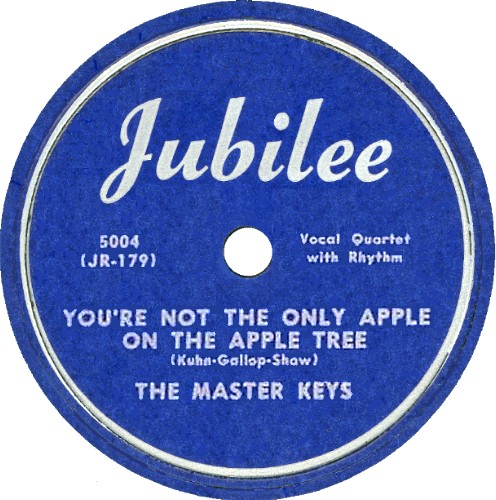
EXTRA RECORD — THE MASTER KEYS
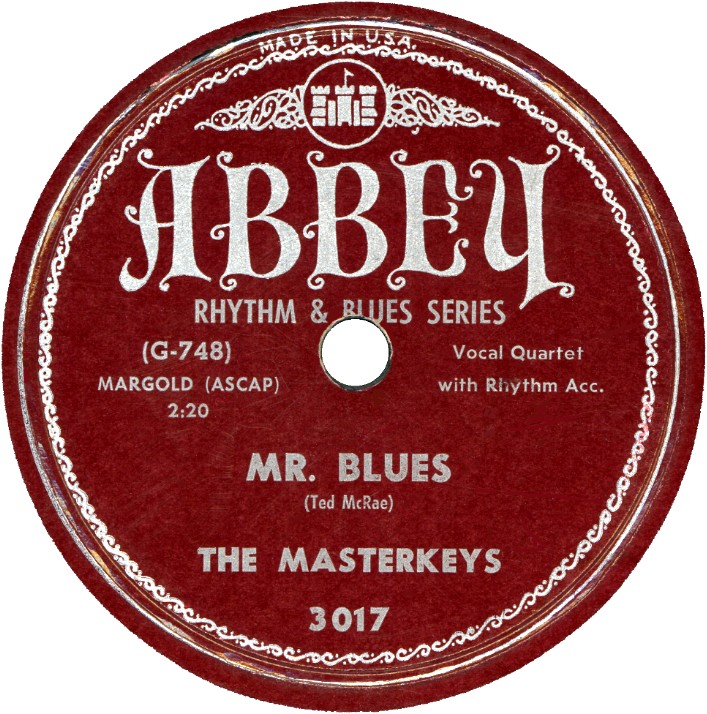
|
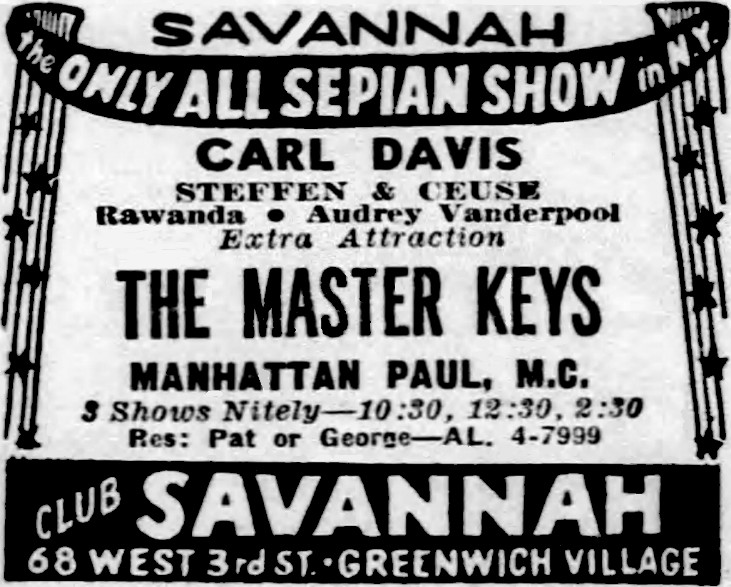
|
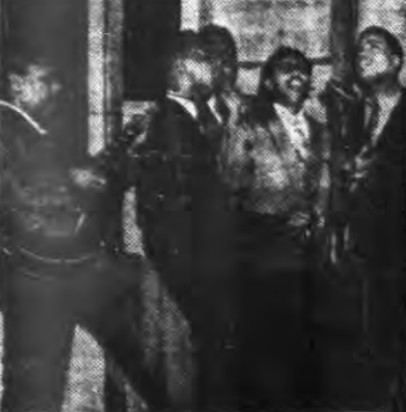
Above Left: Label image for Abbey 3017, released in July 1950. The flip-side, "Don't Cry, Darling", was done by The Four Tunes on Jubilee, released in October 1954. Pat Best, leader of The Four Tunes, composed the song. This is The Master Keys' second of their two records on the Abbey label (1950). Above Right: DAILY NEWS (New York City), August 19, 1950.
At Direct Left: NEW YORK AGE, December 24, 1949. (The Master Keys)
This is the same Master Keys group as on Top and Jubilee, but with changes to the members. The record label has The Master Keys' name incorrectly spelled as one word.
See Marv's article for information about the personnel shown in the picture at left.
Cash Box Review (8/19/50): THE MASTERKEYS — Abbey 3017....
Mr. Blues/Don't Cry, Darling
Vocal harmony of the Masterkeys on this pair is smooth and effective enough to warrant music ops attention here. Both sides of the platter whirl in moderate tempo, with the group pitching soothing vocal strains throughout.The flip side has more commercial possibilities — ops should listen in.
LISTEN (Windows Media Player):
1. "Mr. Blues" - The Masterkeys - Abbey 3017 - 1950.
2. "Don't Cry, Darling" - The Masterkeys - Abbey 3017 - 1950.BOTH SONGS played in sequence.
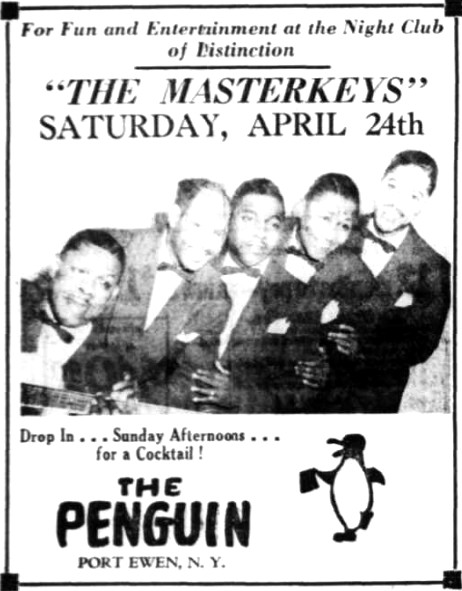
|
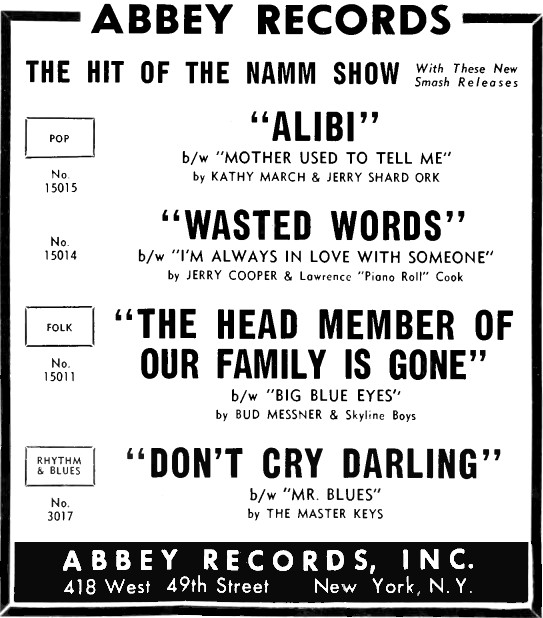
|
Above Left: KINGSTON DAILY FREEDOM, April 23, 1948.
NOTE: Here is another ad for The Penguin in Port Ewen, NY, but with an updated picture of The Master Keys. Per Marv's article, (L-R) Claude Chandler, John Moore, Unidentified, Clarence Roberts, and Phillip White.Above Right: CASH BOX, July 22, 1950.
VIOLA WATKINS
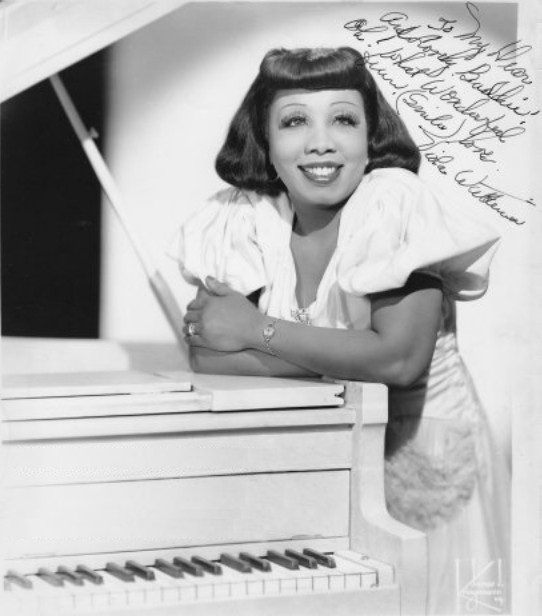
|
Photo of Viola Watkins (1946). [The above photo is courtesy of Gilles Petard.] Viola Watkins was a pianist, singer, and composer. Her first record was on Chicago's Ebony label released in 1946. She had two Super Disc records (1947) and two records issued on M-G-M (1948) from sides purchased from Super Disc. She also had five releases on the Jubilee label (1949-1952), one of these sides backed by an uncredited vocal group (1952).
Viola had one record on Rama Records (1953) and also sang with The Crows on one side (Seven Lonely Days) on Rama Records (1953). She is co-composer of The Crows' big hit "Gee" on Rama, and plays piano on it.
Click HERE for an article about Viola Watkins by Marv Goldberg. (Will open in a separate window)
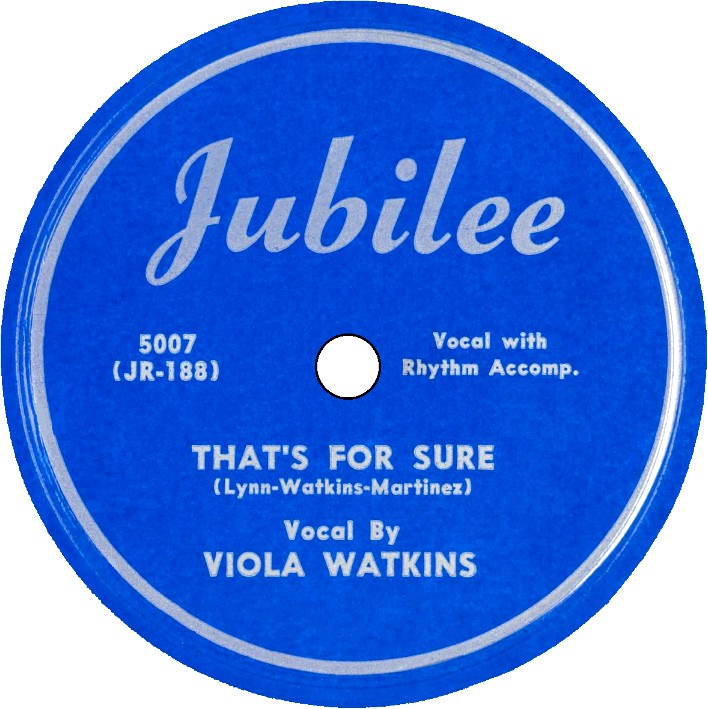
|
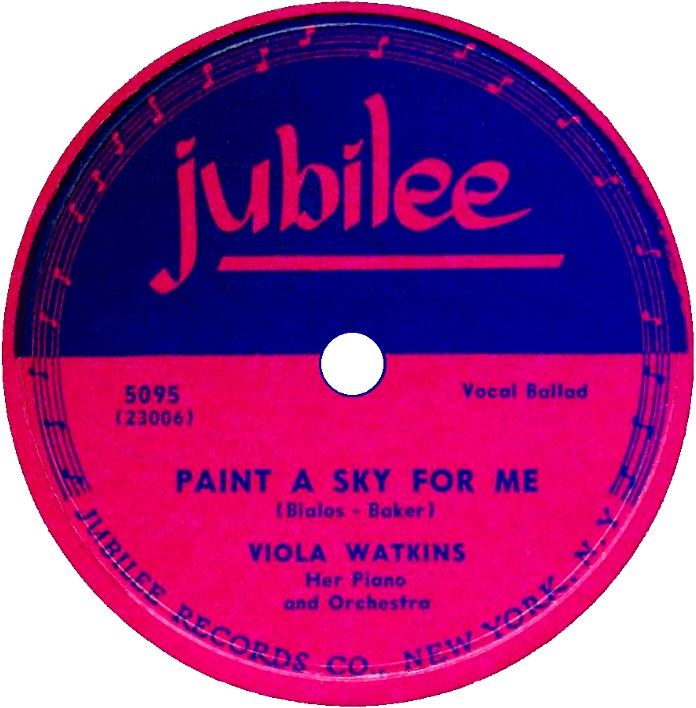
|
Above Left: Label image of Jubilee 5007, released in May 1949. Above Right: Label image of Jubilee 5095, released in August 1952. The flip is a duet with Viola Watkins and Otis Blackwell, but no vocal group backing.
[The above right label image and corresponding audio files provided by Andrew Bohan.]
At Direct Right: CASH BOX, September 27, 1952.
THE BILLBOARD, July 2, 1949:
....Thrush Viola Watkins and warbler Leslie Scott have signed with Jubilee Records....THE BILLBOARD, October 11, 1952:
....Viola Watkins has a solid side on Jubilee called "Really Real"....Cash Box Review (9/20/52):
VIOLA WATKINS — Jubilee 5095
Really Real (B) Viola Watkins, assisted by Otis Blackwell with Quintet, dish up a Latin beat blues in spirited style. An exciting arrangement is capably handled by the aggregation.
Paint A Sky For Me (B) Miss Watkins chants a slow ballad softly. The thrush accompanies herself with a bit of solid keyboard sweeping. Orking is solid.
(NOTE: A rating of B was considered as "very good".)The Billboard Review (9/27/52):
VIOLA WATKINS—OTIS BLACKWEKK — Jubilee 5095
Really Real (78) Over an exotic rhumba blues backing, singers Viola Watkins and Otis Blackwell turn in an attractive and very listenable vocal on this attractive disk. A strong item.
Paint A Sky For Me (65) The thrush sings this new ballad sweetly and with some charm over a mild ork arrangement.
(NOTE: Ratings had a range of 0-100 with 40-69 considered as "satisfactory" and 70-79 as "good".)(NOTE: The review comments don't seem to match the "65" rating. Cash Box gives a "B", very good, for this side.)
LISTEN (Windows Media Player):
1. "That's For Sure" - Viola Watkins - Jubilee 5007 - 1949.
2. "Jelly And Bread" - Viola Watkins - Jubilee 5007 - 1949.
3. "Paint A Sky For Me" - Viola Watkins (With Vocal Group) - Jubilee 5095 - 1952.
4. "Really Real" - Viola Watkins - Jubilee 5095 - 1952.ALL FOUR SONGS played in sequence.
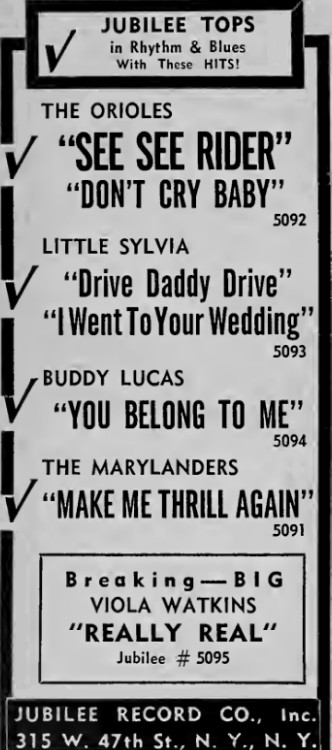
EXTRA RECORD — VIOLA WATKINS
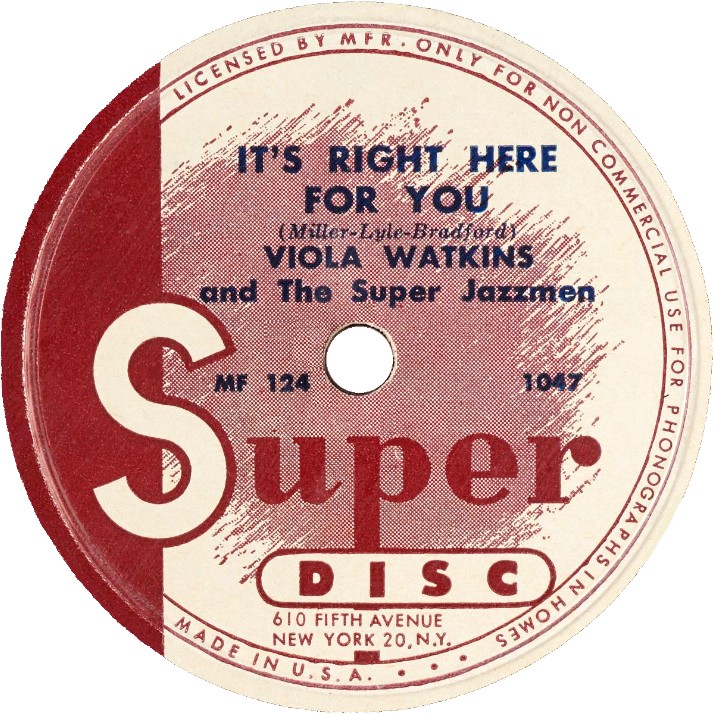
|
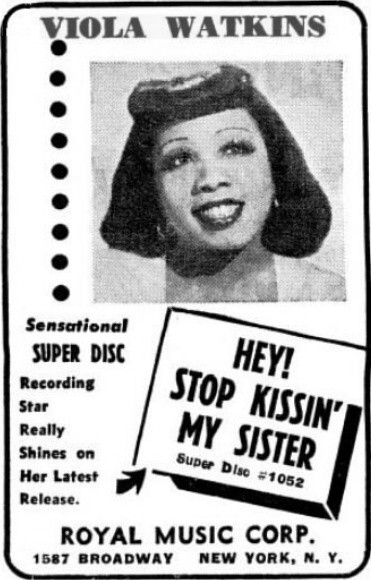
|
Above Left: Label image for Super Disc 1047, released in December 1947. Above Right: CASH BOX, January 31, 1948.
Cash Box Review (12/13/47):
VIOLA WATKINS — Super Disc 1047....
It's Right Here For You/You're In Love With Every One
Scat singing of chirp Viola Watkins echoes here in teeming tones that may hatch coin play galore. Viola's warbling shows mellow with her tonsils spilling in easy manner. Ops with race spots should look into this pancake — the gal can sing!The Billboard Review (12/20/47):
VIOLA WATKINS (THE SUPER JAZZMEN) — Super Disc 1047....
It's Right Here For You (73) Should do well on race jukes. Nice clarinet solo with good rhythm beat by bass and drums.
You're In Love With Every One (66) Vocal chore by Watkins makes disk above average.
(NOTE: A ratings range of 40-69 was considered "satisfactory" and 70-79 was "good".)LISTEN (Windows Media Player):
1. "It's Right Here For You" - Viola Watkins - Super Disc 1047 - 1947.
2. "You're In Love With Every One" - Viola Watkins - Super Disc 1047 - 1947.BOTH SONGS played in sequence.
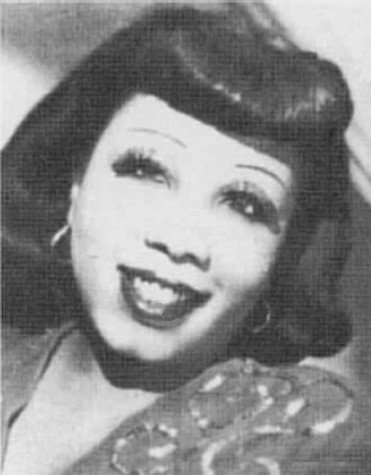

|
Above: AFRO-AMERICAN, January 31, 1948: FOTOFINISH WITH PETRILLO
Viola Watkins, singing-pianist, backed by these cats, cut 16 records for Super Disc just ahead of the Dec. 31 deadline. With Miss Watkins at the piano, are Jimmy Shirley, guitar; Irving Brown, tenor sax; Robert Egoff, clarinet; Gene Brooks, drums; and Lloyd Trotman, bass.(NOTE: The "Petrillo Ban" did not allow union musicians to make recordings, starting on January 1, 1948.)
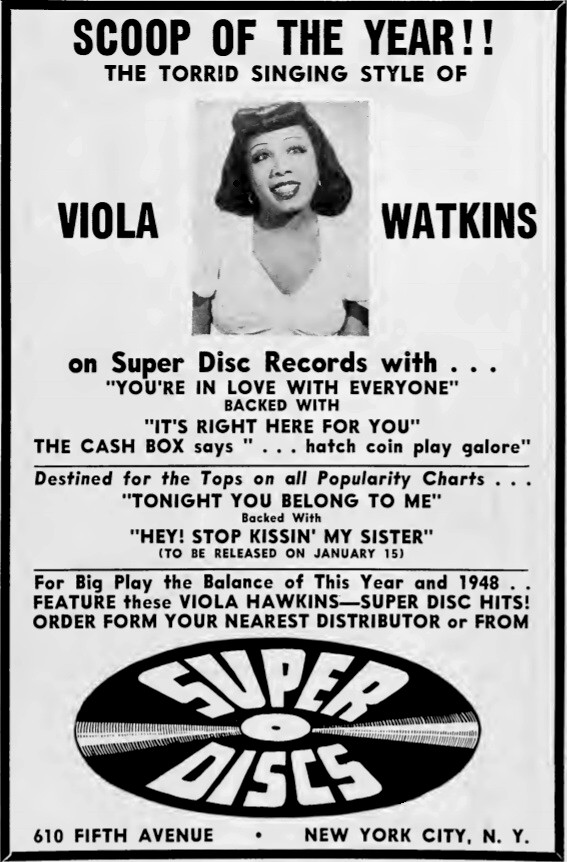
|
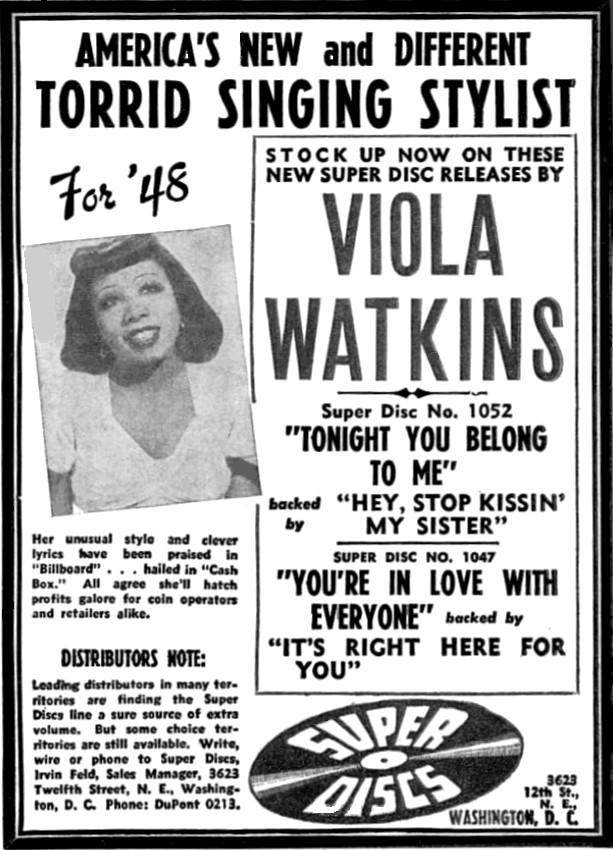
|
Above Left: CASH BOX, December 27, 1947. Above Right: THE BILLBOARD, January 24, 1948.
NOTE: Per the two clippings, between December 1947 and January 1948, Super Disc changed from New York City to Washington, DC. In their January 17, 1948 edition, The Billboard still had Super Disc in New York City. However, Cash Box had them in Washington, DC, in the July 14, 1947 magazine.
RALPH WILLIS
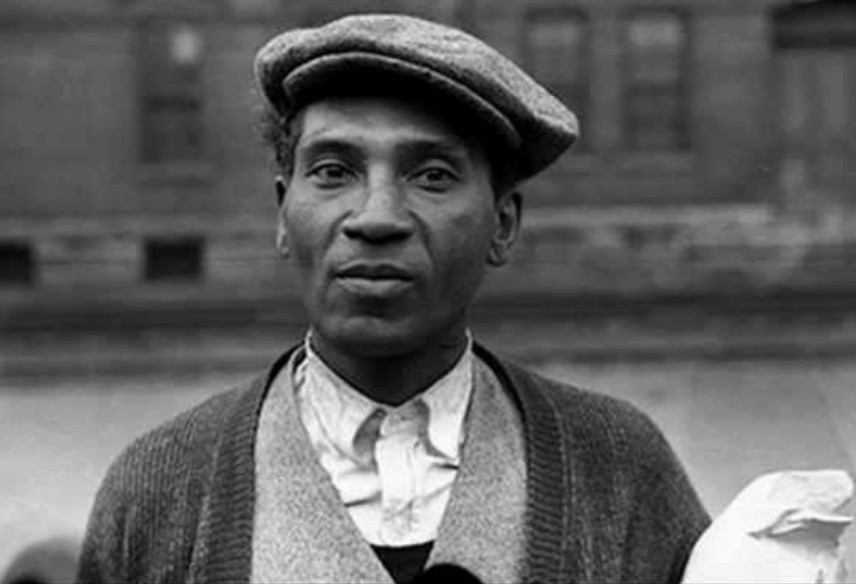
|
Photo of Ralph Willis, who was a Southern blues singer, guitarist, and songwriter. He recorded for various record labels from 1944 to 1953, including Savoy, Signature, 20th Century, Abbey, Jubilee, Prestige, and King. Brownie McGhee (guitar) and Sonny Terry (harmonica) accompanied him on his later records. Willis had two records on the Jubilee label (1950), both with Brownie McGhee.
Above Left: Label image for Jubilee 5034, released in November 1950. Above Middle: Photo of Brownie McGhee.
Above Right: CASH BOX, November 11, 1950.
NOTE: Ooops, they let the "secret" out of the bag by identifying Brownie McGhee's true identity!At Direct Right: Photo of (L-R) Sonny Terry and Brownie McGhee.
The Billboard Review (12/2/50):
RALPH WILLIS (Brownie Magee Ork) — Jubilee 5025
Blues, Blues, Blues (80) Warbler chants a winning Southern-styled blues, underlined by a hypnotic walking boogie figure by guitars, and bass.
Somebody Is Got To Go (80) Tempo picks up for a swinging medium beat blues. Combo gets a fine sound in back of warbler's fine, relaxed chant style.
(NOTE: Ratings had a range of 0-100 with 80-89 considered as "very good".)LISTEN (Windows Media Player):
1. "Blues, Blues, Blues" - Ralph Willis And Brownie Magee Orchestra - Jubilee 5034 - 1950.
2. "Somebody Is Got To Go" - Ralph Willis And Brownie Magee Orchestra - Jubilee 5034 - 1950.BOTH SONGS played in sequence.
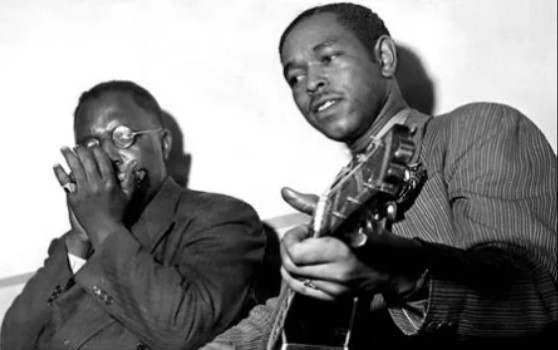
EXTRA RECORDS — RALPH WILLIS
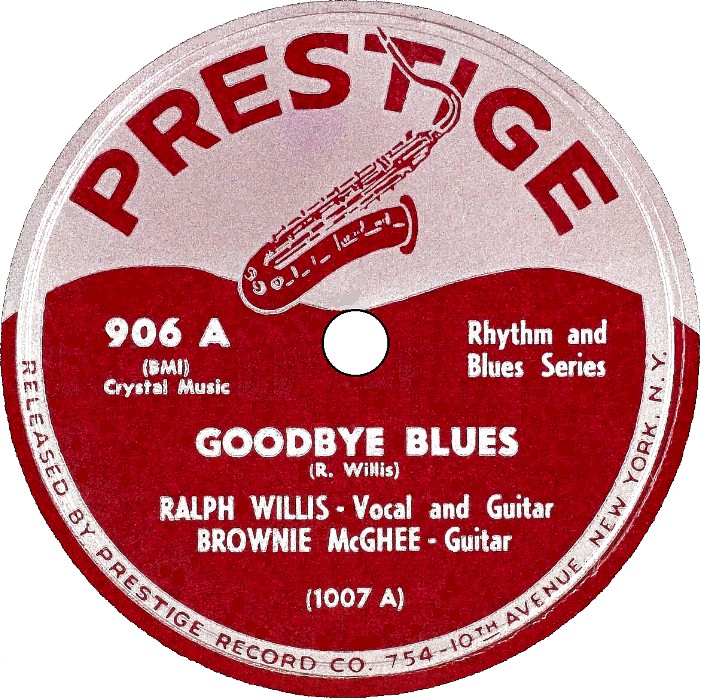
|
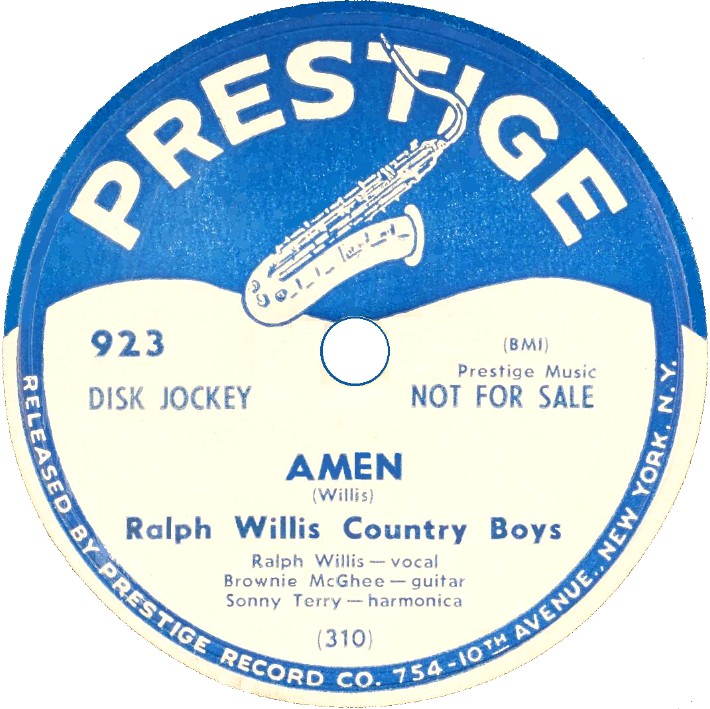
|
Above Left: Label image of Prestige 906 A, released in October 1951. Above Right: Label image of Prestige 923, released in April 1952.
At Direct Right: CASH BOX, April 19, 1952.
The Billboard Review (10/13/51):
RALPH WILLIS (Brownie McGhee) — Prestige 906
Goodbye Blues (72) Willis chants a slow blues in old-fashioned southern style, accompanying himself on guitar in a chord style, while Brownie McGhee puts down a walking boogie figure on another guitar. Limited, but definite appeal here.
Lazy Woman Blues (68) Another blues at slightly faster tempo, done in the same pattern but without quite the same impact as flip.
(NOTE: A ratings range of 40-69 was considered "satisfactory" and 70-79 was "good".)LISTEN (Windows Media Player):
1. "Goodbye Blues" - Ralph Willis (Vocal And Guitar) And Brownie McGhee (Guitar) - Prestige 906 A - 1951.
2. "Lazy Woman Blues" - Ralph Willis (Vocal And Guitar) And Brownie McGhee (Guitar) - Prestige 906 B - 1951.
3. "Amen" - Ralph Willis Country Boys - Prestige 931 - 1952.
4. "Cold Chills" - Ralph Willis Country Boys - Prestige 931 - 1952.ALL FOUR SONGS played in sequence.
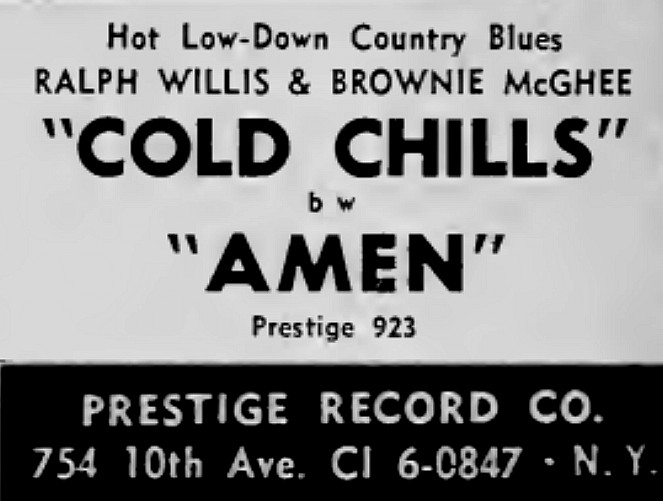
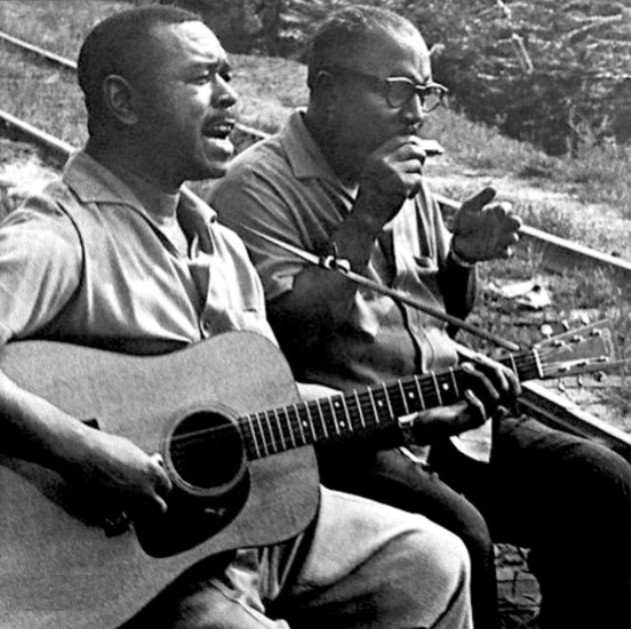
|
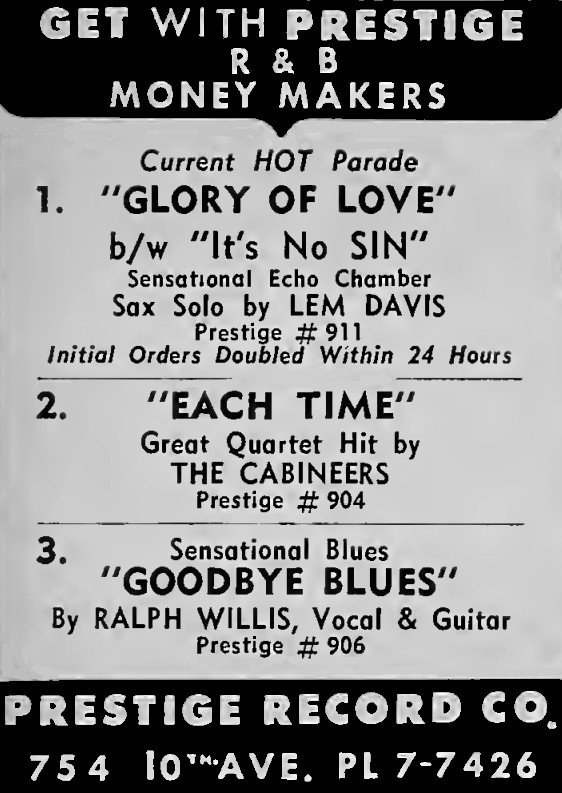
|
Above Left: Photo of (L-R) Brownie McGhee and Sonny Terry. Above Right: THE BILLBOARD, November 3, 1951.
GENERAL CLIPPINGS — JUBILEE RECORDS
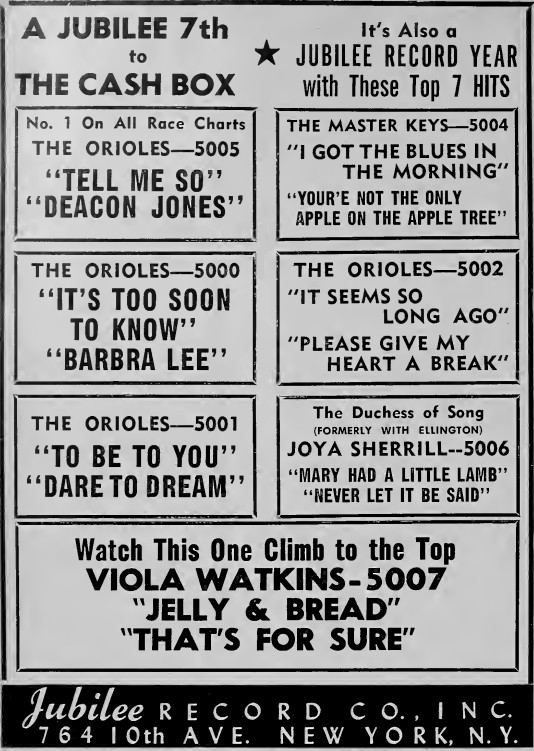
|
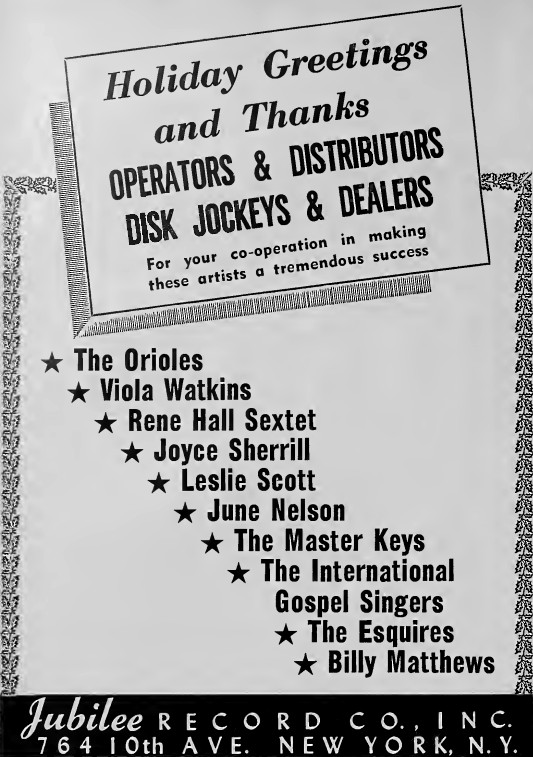
|
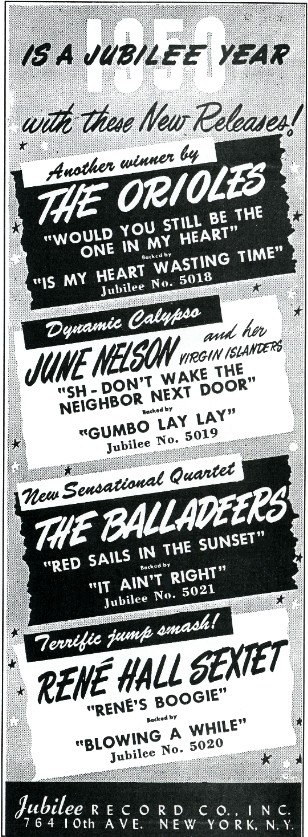
|
Above Left: CASH BOX, June 25, 1949. Above Middle: CASH BOX, December 24, 1949.
Above Right: Jubilee Ad - January 1950.
JUBILEE RECORDS - PART TWO FEATURES THE SULTANS, THE ENCHANTERS, THE FOUR BLADES, THE DELLTONES, EDNA McGRIFF, THE MARYLANDERS, SONNY TIL, LITTLE SYLVIA, THE FIVE SHARPS, AND ANDREW WIDEMAN. ALSO INCLUDED IS ADDITIONAL INFORMATION ABOUT JERRY BLAINE,
OWNER AND PRESIDENT OF JUBILEE RECORDS.JUBILEE RECORDS - PART THREE FEATURES THE DREAMERS, BETTE McLAURIN, LITTLE SYLVIA (RE-VISITED), DOLLY DAWN AND THE C-NOTES, AND THE RAY-O-VACS. ALSO INCLUDED ARE SPOTLIGHTS ON THE SONGS "I MAY HATE MYSELF IN THE MORNING", "I WENT TO YOUR WEDDING", AND "BE ANYTHING, BUT BE MINE".
JUBILEE RECORDS - PART FOUR FEATURES THE TOP NOTES, BUDDY HAWKINS AND THE KEY NOTES, BUDDY HAWKINS AND THE SONGMASTERS, THE FOUR TUNES, GLORIA MANN, THE CARTER RAYS, THE HEARTBEATS, AND THE THREE FRIENDS. ALSO INCLUDED ARE SPOTLIGHTS ON THE SONGS "I'M JUST A DREAMER", "DON'T CRY DARLING", "GOODNITE SWEETHEART, GOODNITE", AND "DON'T TURN YOUR BACK ON ME".
JUBILEE RECORDS - PART FIVE FEATURES THE TOPPERS, THE HURRICANES, THE RAVENS, DELLA REESE, AND ETHEL WATERS. FOR JUBILEE'S SUBSIDIARY LABEL, JOSIE, THE STARLINGS, THE CADILLACS, THE FOUR BARS, PATTI JEROME, THE 5 NOTES, THE KANSAS CITY TOMCATS, AND THE CHARIOTEERS. ALSO INCLUDED IS A SPOTLIGHT ON THE SONG "BYE BYE BABY BLUES" BY THE RAVENS.
Listen to all of this article's audio selections using Windows Media Player:
|
JERRY BLAINE RELATED SELECTIONS:
1. "I Double Dare You" - Jerry Blaine And His Stream Line Rhythm - Bluebird B-7354-A - 1937. JUBILEE ARTICLE RELATED SONGS: 1. "Boppin' At Esquire (Instrumental)" - The Esquires - Jubilee 1001 - 1949.
ALL NINETEEN ABOVE JUBILEE LABEL SONGS played in sequence.
|
Last Update: October 27, 2023
E-mail Me: